[104] Boycotting the Media in Taiwan (09/30/2006) (China Times) For the celebrations of the 20th anniversary of the Democratic Progressive Party, the Southern Taiwan Society (
[103] Counter-attacking
Japanese Porn (09/30/2006) (Lian Yue's column in Southern
Metropolis Daily) Some Chinese netizens are upset at the
Japanese adult video based upon the Chinese novel Dream of the Red
Mansion (see The Sex Slaves of the Red Mansion).
What is the best way to retaliate?
There is the market card. When Tom Cruise's Mission Impossible 3
showed a small ad (see
Product
Placement In Mission Impossible 3),
mahjong players and hanging out clothes to dry in Shanghai, the market card
was played and the film was edited. Although there are even much
bigger scandals in Shanghai than just a small ad, it cannot be shown in a
movie if you want to enter the Chinese market. However, the market
card is useless against Japanese pornography. The products are legally
made and sold outside China and they are illegal in China, so the Chinese
authorities can't threaten them with cutting off sales.
Theoretically, the Chinese netizens could make an adult video spoof video of
a classical Japanese novel, such as The Tale of Genji. This is
not going to work, because it is illegal to make adult videos in China
(unless the authorities make a special exemption). Besides, some
Japanese have probably done it already.
武藤兰/朝河蘭)? "Brother, if you don't know Ran Asakawa, then you don't understand adult video no matter how many you have watched."... The damage from Japanese pornographic works is tremendous. They cause some people to lose their stands. For example, the legendary hero Chen Jinnan could never get the men to unite to oust the Manchurians and restore the Ming dynasty. Meanwhile, Ran Asakawa made many more Chinese young men fall in love with her overnight. When she was rumored to have died recently, many Chinese young men were so sad. Japanese pornography is also causing some promising Chinese young men to die from anger when they detect Chinese elements in certain Japanese adult games and pornography. One way or the other, it is all the fault of Japanese pornography.
Finally, I have to explain to Comrade Police Officer. All the background knowledge in this essay were based purely upon hearsay. I haven't watched any of it. I haven't watched ...
P.S. Who is Ran Asakawa (

[102] Strip
Gate in WoW (09/30/2006) (MOP)
Yet another scandal has broken out in World of Warcraft. This began
with forum post in which a male WoW player wanted to take revenge against a
female WoW player. On July 29, the two met in person and had sexual
relations. Shortly afterwards, the female asked to split up. On
September 19, the male went to Chonginq to visit the female, who got a bunch
of people to beat him up. So the angry male has now posted photographs
of the female on the Internet, together with her name, address, QQ number as
well as logs of their QQ sessions.

Reader comments: "When a girl wants to split up with him, he exposes
her nude photos. What a scary man ...!" "This is just
a QQ chat affair. It has nothing to do with WoW. If you want to
condemn anything, it should be QQ. F**k, what are you linking QQ chat
with WoW. If you don't understand WoW, you ought to shut the f**k
up! Be careful that you may get chopped to death one day without
knowing why!!!"
Here is my comment: "What makes you think any of this is true?
Maybe the guy just picked up the photos from somewhere else, made up some QQ
conversations and used them to attack this gal. This may not the same
gal who is being named."
[101]
The Shanghai Gang (09/30/2006) Okay, so you are
disappointed that I have nothing much to say about the fall of Chen Liangyu
and his cohorts. Hmmm ... That should have been obvious if you
were aware about my adversity about speculating on the fortunes of senior
officials. For the best explanation, please read Why I Don't Talk
Chinese Politics.
To simplify matters, I am of the age that I lived through the age of the
Cultural Revolution as a gullible young person. As a result, I will
never ever accept the superficial statement as to who did what wrong ever
again for the rest of my life. In that experience, every political
fight had seemed to be about some battle over transcendent values
(capitalist roaders versus proletariats, etc.) but it all turned out to be
some sectarian struggle for power. So why should I believe anything
that the propaganda machine has to say now?
However, I was interviewed extensively about the Shanghai gang and I spewed
my guts on everything that I know. I even sent in extensive
photographic evidence. So you can look forward to all that in the
Sunday edition of Ming Pao (HK). I promise that if Ming Pao won't
print everything that I told them, I will state it right here on this
website!
[100] Ban Me Too (09/30/2006) Prime Minister and his father sue Far Eastern Economic Review Reporters without borders. The offending article is here:
Singapore�s �Martyr,� Chee Soon Juan. July/August 2006. By Hugo Restall, FEER.
Striding into the Chinese restaurant of Singapore�s historic Fullerton Hotel, Chee Soon Juan hardly looks like a dangerous revolutionary. Casually dressed in a blue shirt with a gold pen clipped to the pocket, he could pass as just another mild-mannered, apolitical Singaporean. Smiling, he courteously apologizes for being late�even though it is only two minutes after the appointed time.
Nevertheless, according to prosecutors, this same man is not only a criminal, but a repeat offender. The opposition party leader has just come from a pre-trial conference at the courthouse, where he faces eight counts of speaking in public without a permit. He has already served numerous prison terms for this and other political offenses, including eight days in March for denying the independence of the judiciary. He expects to go to jail again later this year.
Mr. Chee does not seem too perturbed about this, but it drives Singaporean Prime Minister Lee Hsien Loong up the wall. Asked about his government�s persecution of the opposition during a trip to New Zealand last month, Mr. Lee launched into a tirade of abuse against Mr. Chee. �He�s a liar, he�s a cheat, he�s deceitful, he�s confrontational, it�s a destructive form of politics designed not to win elections in Singapore but to impress foreign supporters and make himself out to be a martyr,� Mr. Lee ranted. �He�s deliberately going against the rules because he says, �I�m like Nelson Mandela and Mahatma Gandhi. I want to be a martyr.��
Coming at the end of a trip in which the prime minister essentially got a free ride on human rights from his hosts�New Zealand Prime Minister Helen Clark didn�t even raise the issue�this outburst showed a lack of self-control and acumen. Former Prime Minister Lee Kuan Yew, the man who many believe still runs Singapore and who is the current prime minister�s father, has said much the same things about Mr. Chee��a political gangster, a liar and a cheat��but that was at home, and in the heat of an election campaign.
Mr. Chee smiles when it�s suggested that he must be doing something right. �Every time he says something stupid like that, I think to myself, the worst thing to happen would be to be ignored. That would mean we�re not making any headway,� he agrees.
But one charge made by the government does stick: Mr. Chee is not terribly concerned about election results. Which is just as well, because his Singapore Democratic Party did not do very well in the May 6 polls. It would be foolish, he suggests, for an opposition party in Singapore to pin its hopes on gaining one, or perhaps two, seats in parliament. He is aiming for a much bigger goal: bringing down the city-state�s one-party system of government. His weapon is a campaign of civil disobedience against laws designed to curtail democratic freedoms.
�You don�t vote out a dictatorship,� he says. �And basically that�s what Singapore is, albeit a very sophisticated one. It�s not possible for us to effect change just through the ballot box. They�ve got control of everything else around us.� Instead what�s needed is a coalition of civil society and political society coming together and demanding change�a color revolution for Singapore.
So far Mr. Chee doesn�t seem to be getting much, if any traction. While many Singaporeans don�t particularly like the PAP�s arrogant style of government, the ruling party has succeeded in depoliticizing the population to the extent that anybody who presses them to take action to make a change is regarded with resentment. And in a climate of fear�Mr. Chee lost his job as a psychology lecturer at the national university soon after entering opposition politics�a reluctance to get involved is hardly surprising.
Why is all this oppression necessary in a peaceful and prosperous country like Singapore where citizens otherwise enjoy so many freedoms? Mr. Chee has his own theory that the answer lies with strongman Lee Kuan Yew himself: �Why is he still so afraid? I honestly think that through the years he has accumulated enough skeletons in his closet that he knows that when he is gone, his son and the generations after him will have a price to pay. If we had parliamentary debates where the opposition could pry and ask questions, I think he is actually afraid of something like that.�
That raises the question of whether Singapore deserves its reputation for squeaky-clean government. A scandal involving the country�s biggest charity, the National Kidney Foundation, erupted in 2004 when it turned out that its Chief Executive T.T. Durai was not only drawing a $357,000 annual salary, but the charity was paying for his first-class flights, maintenance on his Mercedes, and gold-plated fixtures in his private office bathroom.
The scandal was a gift for the opposition, which naturally raised questions about why the government didn�t do a better job of supervising the highly secretive NKF, whose patron was the wife of former Prime Minister Goh Chok Tong (she called Mr. Durai�s salary �peanuts�). But it had wider implications too. The government controls huge pools of public money in the Central Provident Fund and the Government of Singapore Investment Corp., both of which are highly nontransparent. It also controls spending on the public housing most Singaporeans live in, and openly uses the funds for refurbishing apartment blocks as a bribe for districts that vote for the ruling party. Singaporeans have no way of knowing whether officials are abusing their trust as Mr. Durai did.
It gets worse. Mr. Durai�s abuses only came to light because he sued the Straits Times newspaper for libel over an article detailing some of his perks. Why was Mr. Durai so confident he could win a libel suit when the allegations against him were true? Because he had done it before. The NKF won a libel case in 1998 against defendants who alleged it had paid for first-class flights for Mr. Durai. This time, however, he was up against a major bulwark of the regime, Singapore Press Holdings; its lawyers uncovered the truth.
Singaporean officials have a remarkable record of success in winning libel suits against their critics. The question then is, how many other libel suits have Singapore�s great and good wrongly won, resulting in the cover-up of real misdeeds? And are libel suits deliberately used as a tool to suppress questioning voices?
The bottling up of dissent conceals pressures and prevents conflicts from being resolved. For instance, extreme sensitivity over the issue of race relations means that the persistence of discrimination is a taboo topic. Yet according to Mr. Chee it is a problem that should be debated so that it can be better resolved. �The harder they press now, the stronger will be the reaction when he�s no longer around,� he says of Lee Kuan Yew.
The paternalism of the PAP also rankles, especially since foreigners get more consideration than locals. The World Bank and International Monetary Fund will hold their annual meeting in Singapore this fall, and have been trying to convince the authorities to allow the usual demonstrations to take place. The likely result is that international NGO groups will be given a designated area to scream and shout. �So we have a situation here where locals don�t have the right to protest in their own country, while foreigners are able to do that,� Mr. Chee marvels. Likewise, Singaporeans can�t organize freely into unions to negotiate wages; instead a National Wages Council sets salaries with input from the corporate sector, including foreign chambers of commerce.
All these tensions will erupt when strongman Lee Kuan Yew dies. Mr. Chee notes that the ruling party is so insecure that Singapore�s founder has been unable to step back from front-line politics. The PAP still needs the fear he inspires in order to keep the population in line. Power may have officially passed to his son, Lee Hsien Loong, but even supporters privately admit that the new prime minister doesn�t inspire confidence.
During the election, Prime Minister Lee made what should have been a routine attack on multiparty democracy: �Suppose you had 10, 15, 20 opposition members in parliament. Instead of spending my time thinking what is the right policy for Singapore, I�m going to spend all my time thinking what�s the right way to fix them, to buy my supporters� votes, how can I solve this week�s problem and forget about next year�s challenges?� But of course the ominous phrases �buy votes� and �fix them� stuck out. That is the kind of mistake, Mr. Chee suggests, Lee Sr. would not make.
�He�s got a kind of intelligence that would serve you very well when you put a problem in front of him,� he says of the prime minister. �But when it comes to administration or political leadership, when you really need to be media savvy and motivate people, I think he is very lacking in that area. And his father senses it as well.�
However, the elder Mr. Lee�s death�he is now 82�is a necessary but not sufficient condition for change. Another big factor is how civil society is able to use new technologies to bypass PAP control over information and free speech. The government has tried to stifle political filmmaking, blogging and podcasting. Singapore Rebel, a 2004 film about Mr. Chee by independent artist Martyn See, was banned but is widely available on the Internet.
Meanwhile, pressure for Singapore to remain competitive in the region has sparked debate about the government�s dominant role in the economy. Can a top-down approach promote creativity and independent thinking? The need for transparency and accountability also means that Singapore will have to change. That is the source of Mr. Chee�s optimism in the face of all his setbacks: �I realize that Singapore is not at that level yet. But we�ve got to start somewhere. And I�m prepared to see this out, in the sense that in the next five, 10, 15 years, time is on our side. We need to continue to organize and educate and encourage. And it will come.�
He doesn�t dwell on his personal tribulations, but mentions in passing selling his self-published books on the street. That is his primary source of income to feed his family, along with the occasional grant. As to the charge of wanting to be a martyr, once he started dissenting, he found it impossible to stop in good conscience. �The more you got involved, the more you found out what they�re capable of, it steels you, so you say, �No, I will not back down.� It makes you more determined.�
Perhaps it�s in his genes. One of Mr. Chee�s daughters is old enough that she had to be told that her father was going to prison. She stood up before her class and announced, �My papa is in jail, but he didn�t do anything wrong. People have just been unfair to him.�Explanation: Statement on Singapore Banning the REVIEW Travellers' Tales.
[099]
Cracked? (09/30/2006) When I first bought this computer,
I installed all software (including my personal firewall) before I connected
to the Internet. Then I connected the computer to the Internet. Astonishingly, within five seconds, the firewall
software flashed that an attempted intrusion was detected. So I advise
everybody to protect themselves beforehand and periodically scan their
computers with anti-virus software. Another way of checking is to use
a service such as DShield.org,
which is a database that logs in complaints about IP addresses that have
attacked other machines.
For example, without your knowledge, an intruder may have seized
control of your machine and silently turned it into a zombie to attack other machines. Out of
curiosity, I inquired IP address 69.49.101.19 at DShield. Here is the
screen capture of the query:
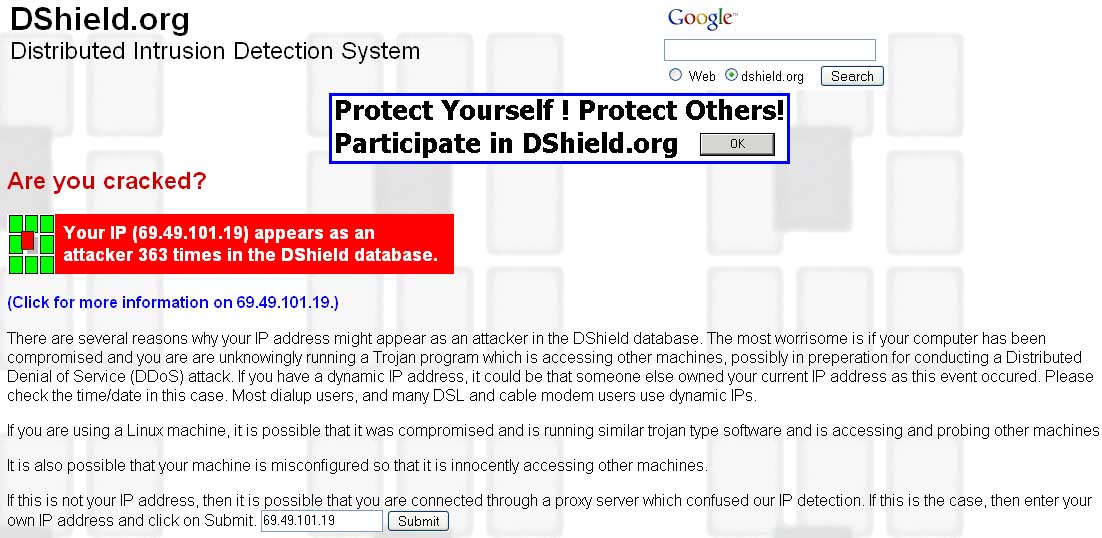
For more information on 69.49.101.19, please see Comment
200609#080. The DShield result was first noted at Steve's
Thoughts. You can try it for yourself. You can also
access DShield.org itself and see if your own IP number has been compromised
too. Oh, anyone whose IP number shows up on the database has the
obligation to clean up their machines/servers ... and that applies to whoever is
based at 69.49.101.19 because you are a public menace.
[098]
Divorce Town (09/29/30) (Beijing
News) This is a case of strange and unintended consequences of
government policies in China. In year 2005, the Liaoning province
Dandong city Tongxing town civil administration bureau had processed a total
of 11 divorces. Then suddenly, during September 6-12, there were 19
divorces including 12 on September 12 alone. Usually, when the
applicants come to the office, the administrator will try to mediate between
contentious couples. But this time, neither party said much, and they
just wanted to go through with the formalities. A study of these
recent showed that at least one member of each couple is an elementary
school teacher in town.
Why the rash of divorces? This was the unintended result of a new
policy, in which teachers will be formally offered employment
contracts. In so doing, it was found that there were 98 current
teachers more than existing positions. Therefore, teachers will be
evaluated and some will have to be laid off as a result. However, the
policy stipulates that special consideration will be given to "widows
or divorcees who are bringing up non-adult children." Thus, it
was time to get divorced in order to earn the special consideration.
In fact, the majority of the teachers who fit the description had filed for
divorce.
What was the answer? Work teams were sent to the schools to talk to
the divorcing teachers and inform them that it was absurd to divorce in
order to get a job. After much work, most of the teachers re-married
with the exception of two who had genuinely troubled marriages. But on
the civilian records, the word "divorce" will remain forever for
those who re-married.
The education department director said that the policy was intended to mean
well by protecting social vulnerable groups and showing humanistic
concern. Unfortunately, some teachers decided to bypass the evaluation
process and take the easy way out to get a job. The education
department head has been suspended from his job pending investigation.
[097] Free Speech Rights for Public Figures (09/29/2006) (Xiamen Commercial Daily via Wenxue City) The incident is simple enough: Through the arrangement of the Xiamen city government, Phoenix TV deputy director Cheng Helin (
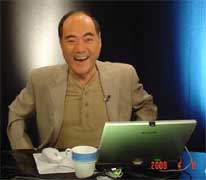
[096] Liangyu (09/29/2006) (Ta Kung Pao)
余秋雨) published an essay titled "That is the name I was talking about" in People's Daily Net about the fall of Chen Lianyu, former Shanghai city party secretary.[in translation]
Renowned scholar Yu Qiuyu (
Yu Qiuyu said that he related something that made him uncomfortable during the pre-recording of his program "Quitu Time" on Phoenix TV. It was the second half of the year before last and he was invited to attend a Shanghai cultural event after not having been to such events for years. At the time, many literary experts were there and they kept mentioning a name in an intimate way (no family name, just the given name). Yu Qiuyu "did not know what was going on." A man sitting next to him answered his query with astonishment: "That is the top leader of this city!"
Yu Qiuyu said, "I felt strange because this leader is definitely not engaged in research in the humanities. So why are these scholars and professors referring to him repeatedly? This is a form of mental kneeling in adoration. Since the target was not present, it can be said to be a form of 'kneeling in absence.'" The name that was being invoked with intimacy by the scholars was "Liangyu."
Yu Qiuyu said that he has brought up his concerns over this incident to his friends dozens of times. On that day, he deliberately emphasized the serious setback in Shanghai cultural activities these days. But those scholars looked at Yu in astonishment and two of them even interrupted him to say that Shanghai was not only setting cultural standards for China, but even internationally. They were talking down at on him.
Yu Qiuyu said, "I was thinking at the time that since we are at a discussion of the humanities, I ought to have greater 'speech rights' than your 'Liangyu'? Your respect for him and arrogance towards me do not represent serious scholarship. When the scholars and professors engage in shameless flattery, these leaders take themselves too seriously. A certain university professor said: 'What Liangyu said last month was also said before by the German Enlightenment philosophers, but he was more innovative.' When so many contemporary intellectuals do these sorts of things, some officials forget who they are."
Finally Yu Qiuyu said that true intellectuals should be responsible for monitoring public power. But most contemporary Chinese intellectuals are engaged in criticizing those without power and take out their jealousies on their colleagues. Over and over again, they referred intimately to a certain leader that they do not personally know with his given name because they want to highlight their position and background and to mislead people that it was the leader's desire to trample on his colleagues -- such is their "wisdom of life."
As you might expect, some Internet netizens said to Yu Qiuyu: "Where were you two years ago?" and "See if you dare to publish this ten days ago" (see ChineseNewsNet).
[095]
Brother Dear (09/29/2006) In Big Discovery in Hong Kong
(May 16, 2006), the story was about an anonymous blogger (under the alias of
Brother Real) who exposed the dealings inside the Hong Kong Democratic
Party. At issue was the struggle between the reformers' group and the
establishment, which was manifested in the form of a 5-person investigative
committee to see if the reformers are recruiting new members for the purpose
of packing the party in future voting and if they are having contacts with
mainland people without reporting to the party central.
The latest sensation in Hong Kong this week is an anonymous blogger (under
the alias of Brother Dear (
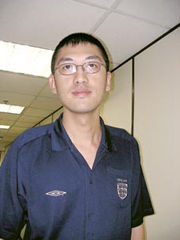
[094] PR = Perception + Reality? (09/28/2006) (Apple Daily; also at the
[in translation]
Recently, there was an alleged case of an independent website being censored by ISP's. The subject in the case was ntscmp.com, which was established in 1997 and is an independent website that made sarcastic jabs at current social ills. Its position is that it is never afraid of offending people, including Li Ka-shing and his son Richard Li.
It was the website operator George Adams who revealed the case. He publicly stated that some netizens cannot properly visit the website, but only Netvigator and Hutchison Global Communication users had those problems. He called for netizens to complain to the Office of Telecommunication Authority.
The incident then developed with the Internet Society experts tracing the signal paths (a simple command that any user can test himself) and finding that the problem originated from outside Hong Kong. Famous bloggers such as EastSouthWestNorth's Roland Soong and other experts also explained that the blocking was not due to any actions by Netvigator and Hutchinson Global Communication. But like the drama in Potato Judge, even if the prima facie evidence does not exist, the Li family has been pronounced guilty.
Actually, anyone who understands anything about the structure of the Internet would not be jumping to a hasty conclusion. In the Internet world, information communication is bi-directional. The server is on one side and the end-user is on the other side. For example, the end-user wants to view a short video hosted by an American server. The end-user must send a command to the server and then the server will fetch the video and send it back to the end-user.
When one cannot visit a website, it does not have to be solely a problem with the ISP. It may be that something is wrong with the server or the end-user. For example, the server may limit the number of users or the restrict access only to some users. Also the end-user may have problems with the hardware (network card or modem) or browser software, or even infected by computer viruses. All these things may cause the website not to be properly displayed.
Another reason is that the ISP's cache engine (cache engines are used by ISP's to save the cost of accessing overseas website and increase network speed) has not yet updated its information so that the users are only seeing outdated information, or nothing at all. This is an issue with the effectiveness of the cache engine, and not because the ISP deliberately censored a specific website. This time, the two ISP's got the blame because netizens do not understand the structure of the Internet and also because of the negative image of the Li family.
The alleged ntscmp.com censorship case obviously showed that the public was pre-disposed against the Li family. But the public relations people at the two ISP's chose "silence" and "avoidance" to deal with the prejudices of the netizens. There are three possibilities:
1. They don't know the truth and they don't have the technical competence to get to the bottom of it;
2. They don't like their two bosses and they share the prejudices of the netizens;
3. They don't know how to deal with the matter and they believe that if they choose the ostrich policy, netizens will forget about it in a few days.I have been in the public relations field before, and I dare say that (1) is unlikely and (3) is most probable.
But there are very few people who understand the whole affair and the point is not whether the ISP's were censoring ntscmp. The point is whether the netizens will continue to hold the perception about censorship. Undoubtedly, several days later, nobody is talking about incident anymore. But when something else ever happens with Netvigator or HGC again, people will surely resurrect this affair. At that time, even though this censorship case is still an allegation at this time, it will be treated as fact next time. I want to remind the public relations people at the two ISP's that it requires tremendous effort to overturn a case, and it is often beyond the means of most public relations people.
When I was in public relations years ago, my boss and mentor said that PR is the abbreviation for "Perception & Reality." The facts and prejudices are always unavoidably separated. To bring the two together is the most basic thing that public relations people do every day. This is so-called "bridging the perception gap."
Unfortunately, most public relations people in Hong Kong have no standing or knowledge. When nothing happens, they wine and dine their clients. When something happens, they have no comments. Public relations people working for companies only know how to read their bosses' minds. Or maybe they know how to write some press releases. But how many of them know how to manage the perception gap?
If you cannot even do something this basic, you are better off giving up and going to Marcom to do publicity. Please do not drag your company down. These so-called public relations people, whether they like the two Li bosses or not, are guilty of fulfilling the prejudices of the netizens.
[093] Taiwan Independence Issue in Hong Kong (09/28/2006) From Self-Censorship in Hong Kong Under Britain and China by Kin-ming Liu in Washington Post:
When I asked Peng Ming-min, the godfather of Taiwan's independence movement, to write an op-ed, the chief editor, fearing that it might violate Beijing's position on national unification, removed the piece at the last minute. In fact, up to this very minute as far as I know, there's no law in Hong Kong forbidding the advocacy of Taiwan independence. Better do it before the masters utter the order of course.
People get the kind of press they deserve, I hate to admit. As long as the consumers in Hong Kong, constantly named as the freest economy on this planet earth, choose to support those media which engage in self-censorship, there's not much individual journalists can do to change the tide and alter the big picture. Self-censoring newspaper owners won't have a firmer backbone as along as their pockets aren't hurt.If you believe that Hong Kong is a free market, then those newspapers that cover the issues that the consumers want will be rewarded. So what is the market for Taiwan independence in Hong Kong? If there is a huge and unsatisfied demand, a newspaper can exploit this open space.
Here is a Hong Kong University Public Opinion Programme poll (telephone interviews with 1,007 respondents conducted during September 1-7, 2006).
Q: Taiwan independence?
81% oppose; 12% supportQ: Confidence in cross-strait reunification?
59% confident; 34% not confidentQ: Taiwan rejoin the United Nations?
58% oppose; 27% supportQ: "One country, two systems" applicable to Taiwan?
53% applicable; 35% not applicableWhat is the market for a Hong Kong newspaper that wants to advocate (or even just discuss in a fair and balanced manner) Taiwan independence?
Related Link: Does Article 23 Really Matter To Beijing? Letters from China
[092]
Freedom of Speech Trampled Again in Hong Kong
(09/27/2006) (Apple
Daily, mentioned by Sidekick)
Since the school year started, there has been three student suicide deaths
already. So when the fashion chain store FCK (for Fashion Community
Kitterick) began selling HK$229 t-shirts with the words "I hate myself
and i want to die," there was strong criticisms from the educational
community. Now the store chain has agreed to withdraw those t-shirts,
although the reporter could see them at the Causeway Bay store.

[091] Reporters Beaten in Guangzhou (09/27/2006) In Reporters Beaten At Shenzhen PAAG Trial, it was stated that the Hong Kong media:
... will definitely share their films, photographs and reports when their own colleagues are assaulted to achieve maximum impact on public opinion and pressure. This occurred across the entire political spectrum of the newspapers because no matter what your position is (e.g. pro-China or pro-democracy), it is just wrong to assault any reporter trying to gather news. Mainland media should note this type of solidarity is a powerful form of protection -- nobody will think about assaulting one reporter when they know that the whole country will know about this the next morning.
Yesterday, in the Baiyuan district of Guangzhou, a vehicle jumped over the barrier on a bridge and fell into the river. When eight reporters from four different media outlets arrived, they were accosted by men dressed in plainclothes or security uniforms, and roughed up. Afterwards, the attackers were seen to walk into the Renhuo town government office building.
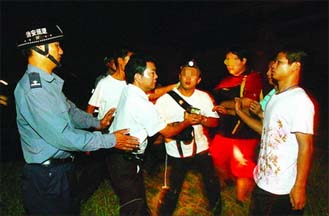


So what happened afterwards? The newspapers shared their photographs and interviewed each other's reporters. Here is the front page story from Southern Metropolis Daily which quotes the individual reproters.YCWB reporter: I was called to cover this suddenly breaking incident, and I did not expect to encounter this situation. Apart from anger, shock and depression, I also feel helpless. Even today, some people think that they can shut everything down and that force is the solution for problems. That is very naive.
Southern TV reporter: When I was dragged from the dam into the dark room, I was afraid because I did not know what was going to happen. Three or them grabbed my arms and another wrapped me up with his arms. I could not see anything inside the room. Several people pinned me against the wall while another tugged at the equipment. I asked, "I won't film then" but they still wanted to seize it. I thought that I had to protect the eqiupment and preserve the evidence, so that everybody can see their ugly performance.
New Express reporter: This was obviousl a malaciously organized assault on reporters. Throughout the entire incident, none of the reporters did anything wrong. But I don't know who was directing these steel-pipe-wielding men wearing steel helmets to attack unarmed reporters.
Southern Metropolis Daily reporter: After being taken into the dark room, someone seized the camera of our photographer and dropped it on the ground. Then someone else tossed the camera out the door. We went up to retrieve it but they pushed and punched us. We slowly backed up out of the room. In the confusion, our photographer stepped on a nail and started beldding. (Photograph of nail on board and the x-ray of the foot is shown below).

In the evening, the Southern Metropolis Daily reporter contacted Renhuo town party publicity committee member Chen (who is a deputy town mayor) who said: "According to my understanding, our security people did not assault anyone. There is no doubt about that." When the reporter asked him about his view on the attack on the reporters, he said: "You people claimed that there was an incident. I do not accept that it happened."
Answer: We need a YouTube video! Five million viewing afterwards maybe Mr. Chen will respond appropriately. (See CCTV via ChineseNewsNet)
[090]
The Vanishing Chinese Pigs Act (09/27/2006) (Taiwan
News) On the front page China Times story on September 25, it
was reported that in the headline that Democratic Progressive Party chairman
Yu Shyi-kun had called anti-Bian demonstrators "Chinese
pigs." Afterwards, cable television station TVBS-N reviewed its
tapes of Yu's public remarks over the past two weeks and was able to
determine that Yu did not use the term as reported.
On September 26, Yu filed a libel suit against the two China Times reporters
whose bylines appeared in the report and the paper's editor Wang
Chien-chuang.
On September 26, China Times published an apology in a small space on the
top half of the second page: "Although DPP Chairman Yu Shyi-kun has recently made certain remarks that sparked public concern of escalating ethnic tensions, including that 'the depose Chen movement was Chinese people bullying Taiwanese people,' the paper has verified that Yu did not use the term "Chinese pigs" as was reported in our front page story on September 25. We therefore offer an apology to Chairman Yu and our
readers."
While the apology has at least cleared the chairman's name, it is was
published in a space disproportionate to the original headline. Yu
will discuss the matter with lawyers about his next steps.
Note: The problem with covering this story is that you need to have
physical copies of the printed editions of China Times. The electronic
China Times does not show the headline as it appeared in print, and the
apology could not be found (correction: it can be found
by searching for "Chinese pigs"). Instead, much of this story depends on
other media reporting.
Note: Another unsatisfactory aspect of such stories is that there is
never an explanation as to how it happened and what kinds of procedures were
or will be in place to prevent just this type of thing. Need I invoke
the saying that those who don't learn from history are doomed to repeat it?
[089] Positive Solutions Closed Down (09/26/2006) I went out for the evening and I returned to find this email:
Hi Roland,
I see you have been writing a lot about the [non] censorship of the blog NTSCMP in Hong Kong. But in Beijing there is another blog that has been censored by China Daily.
Not sure if you've been following the blog of one of the China Daily editors, called Positive Solutions (
http://www.20six.co.uk/positivesolutions). The guy who did it, Charlie, is an English editor there, but he just got told to take it down or lose his job and get his working visa cancelled. Friend who works at 21st Century (part of China Daily), says this week all foreign staff have been told they must sign an agreement not to keep blogs unless they are "official" China Daily editorial ones like those by Raymond Zhou.Management at China Daily are not happy about foreign staff bloggers since another foreign editor wrote a revealing blog about the place last year (called State Secrets) and a female Australian former editor has just published a scathing book about the place too [Kirsty Needham, A season in the Red, you might want to review it].
Last I heard, Charlie was looking for "alternative employment", (though he hasn't been fired) and another female editor is refusing to close down her [non-work-related] Beijing blog.
Since you gave so much coverage the non-censorship of a HK blog, is it fair and balanced to show that real censorship is occurring to the blogs of westerners in China?
Wow! So I go over to Positive Solutions and here is the most recent post (note: I'm reproducing it here just in case ... you know ... that site gets taken down).
In between (eye-wateringly tedious) stories at work this evening, I started flicking through a few blogs. To my great surprise, I found a story (swiftly removed) on a major blog that Positive Solutions had been shut down, and I had been silenced by THE MAN!!!
In a published email to the author of the blog (which shall remain anony-mouse), someone wrote: �The guy who did it, Charlie, is an English editor there, but I heard he just got told to take it down or lose his job and get his working visa cancelled. One of the senior foreign editors on the China Daily website found his blog by chance and saw the negative comments that Charlie and other commenters had made about some of the Chinese staff and the China Daily editorial policy.�
He then went on to cite an entirely fictitious person at China Daily dobbing me in. I know it was fictitious, because there is no-one here that fitted the description given.
The blog author then noted that, according to his source, all China Daily staff will be required to sign an agreement not to blog. He also expressed his surprise that Positive Solutions �lasted as long as it did.�
All of which, quite frankly, is f**king hilarious.
Someone has taken the time out of their day to make up a story about China Daily attempting to silence one of its foreign editors, pertaining to have knowledge of the inner workings of the place.
Permit me a few observations:
* This person has too much time on their hands.
* I suspect this is the work of the person who listed this blog on Wikipedia.
* I hope this is not some Han Rui Dismissed From Office-style obscure hint/warning for me to shut the hell up
* This person has obviously been reading this blog very closely, of which I�m grateful
* Perhaps I�ve got an e-stalker? Discomforting, but not as bad as a real one (I�ve had one, and she was ugly. In all senses of the word)
* The thought that the management of China Daily would give a toss about what I have to say about anything is laughable: As I�ve said repeatedly, as a 24-year-old white boy, I�m the lowest of the low at China Daily.
* Could this be a malicious muck-spreading attempt, aiming to create an online uproar and bring the name of China Daily into serious disrepute.Now that last one is a thought.
But anyway, I�m still here, and I�m not going anywhere.
Maybe I�m going to be bundled dramatically out of my apartment at 4am this morning and given the golden bullet? But I doubt it. I�m not revealing anything secret, because I don�t know anything secret. I have a rant and rave about a few things, but I�m 24-year-old male who isn�t getting any sex. What do you expect�harmony?
Let me also point out one major flaw in this rumour: the suggestion I would sign a contract to shut up.
I would walk away in an instant if that ever happened.
This would occur either because I had gone too far in my writings and been causing serious damage to my employer, which would be thoroughly unprofessional, or because they were being utterly unreasonable.
No-one will ever silence me, other than myself. Or my mum.
[088]
Red Car For Sale (09/26/2006) (Apple
Daily, United
Daily News) In the 919 anti-Bian demonstration in Tainan, a
red car was attacked by pro-Bian supporters. Given that the car was
going to cost NT$130,000 to fix, it would have been worth only 1/3 its price
(or just over NT$100,000) if sold to a used car dealer. Therefore the
owner posted the car on Yahoo! auction, describing it as the "919 Super
Sensational Red Ford Sedan."

In three days' time, more than 60,000 people viewed the page, almost 300
left comments and 50 people made bits. The current high bid is
NT$530,400. One commentator said: The damaged car is proof of
democracy in Taiwan. "At an auction to raise funds for election
campaigns, some rich person will probably pay a sky-high price for it."
[087]
Netizen Opinion on NSTCAMP.com case (09/26/2006) In Comment
200609#086, there is a report on the technical investigation
conducted by the Hong Kong Internet Society. The
last finding was: " But normally such behaviour happens when the end site closes the connection from Netvigator etc., because it maintains a blacklist of networks that they do not want to serve, e.g. if these networks may be a source of worms or viruses."
What does that mean?
The post
[in translation]
This incident drew the attention of many netizens, with quite a few being certain that it was censorship. But I feel that one must base one's conclusions upon the facts and then analyze them carefully. Absent any proof, HBC and PCCW are both innocent. But if we are suspicious of HBC and PCCW, we need to be equally suspicious of ntscmp.com in order to be fair.
In conjunction with the findings and analyses of other netizens, I have the following points of suspicion:
1. I have never visited ntscmp.com before and I began to pay attention only after this incident. According to data from alexa.com, ntscmp was ranked 1,306,455 three months ago and today it is ranked 33,330, for a rise of 1,775,537 places. If you think the ISP's are censoring this site because HGC and PCCW users cannot connect to it, then I think the above is even more suspicious. Is it possible that someone pulled a trick in order to attract eyeballs?
2. Some netizens using HGC and Netvigator were able to enter the website. So why does that website insist that HGC and Netvigator users cannot go there?
3. As the two largest ISP's in Hong Kong, why would they bother to block a relatively unknown website?
4. If some netizens using HGC and Netvigator can still enter the website, then why kind of censorship is this? I think the two system administrators must be busy looking for new jobs!
[086] The Internet Society Report on NTSCMP.com (09/25/2006) From the blog of Charles Mok, chairman of the Hong Kong Internet Society:
Since yesterday, our technical experts in Internet Society Hong Kong has investigated into the incident, and here's what we have found so far:
- Users from Netvigator and HGC cannot access ntscmp.com, but users from most other networks can.
- Using "telnet ntscmp.com 80" to test the connection over Netvigator, we observe that in general the user can connect to the site for less than 1 second, but the connection was closed gracefully (no error message of disconnection) shortly. The obvious possibility is that the site accepts and then closes the connection from Netvigator.
- From the fact that our testers from these networks can get connected to ntscmp.com for a short moment, we have reasonable evidence that they did not impose a simple firewall blocking on the IP of ntscmp.com.
- Reading the results from tcpdump on the connection, it was a FIN packet that closes the connection gracefully.
- Normally a FIN packet is sent from the server to end a session, but it is technically possible for any administrator with sufficent privilege between the user and the network (ISP) and the endpoint (website) to send such a FIN packet to the user.
- Unless we can plant a sniffer at each segment to see which segment originates the packet, it will be virtually impossible for us to know where the FIN packet comes from. In other words, technically it is entirely possible that some third party (other than Netvigator and ntscmp.com) sends a RSET packet to clear the connection.
- But normally such behaviour happens when the end site closes the connection from Netvigator etc., because it maintains a blacklist of networks that they do not want to serve, e.g. if these networks may be a source of worms or viruses.
In summary, our conclusion is that we cannot find any evidence of a block imposed by the accused ISPs on the website in question. Connections from these ISPs to the website are flagged and closed gracefully and this can be caused by any third party who gained sufficient privilege or the endpoint website. But it is also virtually impossible for us to be able to investigate as a third party without such privilege to sniff into all the segments on the network.
Because of these observations, at the moment we do not believe the accused ISPs imposed any block on this website. We welcome any further input so that we can further investigate.
[085]
The Cable Thief (09/25/2006) (Southern
Metropolis Daily) At 4am in the Baiyun district of Guangzhou,
a man attempted to climb up and steal an electricity cable. He was
electrocuted and died instantly, while still holding a cable cutter (with
yellow handles) in his hand. It is estimated that the black market
price for the three cables each running 7 or 8 meters in length is not more
than 1,000 RMB.

[084] Jasper Tsang on Anson Chan's Decision (09/25/2006) (Ming Pao) (Note: Jasper Tsang is the former chairman of the DAB party in Hong Kong)
[in translation]
Anson Chan finally announced that she will not run in the Chief Executive election next year. At the press conference, she said that she "had never thought about" entering the CE election. Few people believe that. Her famous words "I'll take one step at a time" and "Who knows what will happen in the next few months?" had unavoidably made people speculate about her plans. Even if she had not decided to go ahead, she could not be said to be totally disinterested. If she really was uninterested and only wanted to study the development of the Hong Kong political system in order to come up with some constructive recommendations, she would have an easier time if she had come out earlier to say that she was not running. That would have lessened the suspicions of the central government and the SAR government senior officials and also persuade more people to become her partners.
She explained why she said nothing about her intentions with respect to the CE election: "In politics, everybody has learned not to take a position until the most critical moment." This saying is peculiar and unconvincing. No wonder the media are saying that she "gave up" or "backed down."
Mrs. Chan clearly knows that many of her friends in the pan-democratic camp were hoping for her to run and thought that she might run. Therefore, she needs to say "sorry" to those people who are disappointed by her decision not to run.
But the pan-democratic camp are even more disappointed, because Mrs. Chan expressed two points at the press conference:
1. She said that she will not help the CE candidate chosen the pan-democratic camp;
2. She said that she will support "a person who acts responsibly for Hong Kong, who will rule Hong Kong with openness, transparency and public trust and who will implement 'one country, two systems'" as CE.
These conditions do not include supporting the implementation of universal suffrage in 2012 (or as quickly as possible), or acting responsibly for democracy. These two points should disappoint the pan-democrats.
This has to be an obvious turnabout in Mrs. Chan's political attitude. Since her unexpected participation in last December's "Anti-political reform demonstration march," Mrs. Chan has spoken many times about supporting democracy and universal suffrage. She stood with the pan-democrats and urged people to participate in this year's July 1st march. She openly called for Chief Executive Donald Tsang to "do his best to get democracy for the people of Hong Kong." In late July, she was interviewed by CNN and she said that she is planning to form a "core group" in order to promote universal suffrage. She said "it is necessary to persuade more people to join the democratic ranks so that our voices are louder. Otherwise, we cannot convince the central government and the Hong Kong government to implement universal suffrage."
Mrs. Chan's current position is clearly to draw a line between herself and the pan-democratic camp and cool down her own "fight for democracy." Her core group does not have any pan-democratic representative. According to her own explanation, the core group "will be mainly studying the model and route to universal suffrage" and "the work will be complicated and is estimated to take months or even years to complete." This meant that the core group does not plan to do anything during the critical period leading up to the election of the Chief Executive, especially with respect to applying pressure on the CE candidates about the time table for universal suffrage.
The objective consequence of this turnabout was that Mrs. Chan is at a longer distance away from the pan-democratic camp and this creates some room for her to mend her increasingly tense relationship with the central government. Outsiders can only speculate as to why she chose to change the attitude that she held for most of the year. If she were ten years younger, the current changes may lead people to speculate. But time is not on her side, and it is difficult to think that the Mrs. Chan of today still has any long-term plans.
(Ming Pao) Lee Peng-fei is a National People's Congress representative and a member of Anson Chan's core group. He said, "It does not matter how good a proposal is. As soon as it is connected with the pan-democrats, it has no future!" According to his analysis, first of all, the pan-democrats cannot even visit Beijing. If Beijing thinks Anson Chan is in the same camp as the pan-democrats, they won't even look at the proposal from the core group. Secondly, the people in the core group can rationally consider the degree to which Beijing might accept the proposal for political reform whereas the pan-democrats will not.
[083]
Taiwan By the Numbers (China
Times; China
Times) (1,090 respondents interviewed September 20-22 using
the Taiwan residential telephone directory as the sampling base).
Q1. Who is responsible for the clashes between anti-Bian and
pro-Bian supporters?
43%: Pro-bian supporters
22%: Anti-bian supporters
19%: Local leaders
4%: Police
Q2. If these clashes continue, what is your worst feared negative
consequence?
41%: Economic impart
27%: Wider clashes may hurt innocents
16%: Bad example for kids
6%: Affect security
3%: Affect traffic
4%: Not worried at all
Q3: If A-Bian refuses to resign, do you support Shih Ming-teh campaign to
lay siege to the Presidential Office on National Day?
46%: Support
51%: Do not support
Q4: Some people are concerned that a siege of the Presidential Office
will damage Taiwan's image internationally. What is the best way to
handle this?
60%: Let it be -- Taiwan will accept the responsiblity
29%: The anti-Bian camp should cancel the siege
8%: Change the location for the National Day celebrations
Q5: Former president Lee Teng-hui may initiate discussions with Lian
Chan, James Soong, Lee Yuan-tseh and others after which Legislature Speaker
Wang Jin-ping will communicate with President Chen Shui-bian about the
resignation process. Do you support this?
53%: Support
41%: Do not support
Q6: Should President Chen Shui-bian resign?
53%: Yes
41%: No
The other China Times article refers to a different survey result: 65.4% of
the survey respondents say that President Chen Shui-bian should
resign. The three weekly polls show the trend as follows: 73% ->
72.1% -> 65.4% supporting and 26% -> 27.9% -> 28.7% not supporting
resignation.
[082] Zidane Headbutts Long Hair (09/24/2006) (Ming Pao) Yesterday, Hong Kong Cable TV was interviewing Civic Party legislator Alan Leung in Mongkok when another legislator Leung Kwok-hung (nickname "Long Hair"

[081]
The Internet Effect (09/24/2006) Even one year ago, the
following kinds of stories may not be reported in mainstream newspapers in
Hong Kong.
(Oriental Daily via Yahoo!
News) A fourteen-year-old boy in the third year of a Hong Kong
secondary school posted to a discussion forum on September 22. The
title was "I just had a quarrel with my mom." The deal was
that he was only supposed to get tutoring on Sunday, but now his mom wants
him to do that on Saturday, which was his only leisure day. Therefore,
he said that he wanted to "hire someone to beat up his mom."
The price was negotiable and he left his email address and ICQ number.
This post generated condemnations from netizens. When interviewed by
Oriental Daily, the mother said that she believed that it was just an
emotional outburst at the spur of the moment, that the son was not expected
to carry through the plan and that she was probably despotic.
(Oriental Daily via Yahoo!
News) Right after the case of the case of the netizen who
asked for information on building a suicide bomb to attack
"Didiland" (see Comment200609#079),
another netizen named Angus got on a discussion forum and proclaimed:
"Where can I buy a bomb? I am going to bomb the Convention Centre
tomorrow (
[080] 69.49.101.19 (09/24/2006) This is a follow-up to the matter of the North American routers not completing the routing to NTSCMP.com (see Permalink). First, from Internet Censorship Explorer:
ntscmp.com is hosted on a web hosting company in the U.S. Its IP address is 69.49.101.19 [reverse DNS - hostedc10.megawebservers.com] and at least 5,439 other domain names are also hosted on that IP address.
That is right: at least 5,440 domain names, including ntscmp.com.
What about 69.49.101.19? Is there anything special that merits special attention? So I googled "69.49.101.19." There are several entries of interest.
Internet Defense (Phisery): A phishing email was sent on July 22, 2006 from Italy. The purpose of the email was to get customers of Halifax Bank (UK) to enter their security information at a fake website. The resource used was at 69.49.101.19. It is noted: "The details will either be fake, or belong to another authority which owns a web server which has been compromised by the attacker."
Internet Defense (Phishery): A phishing email was sent on August 10, 2006 from the United States. The purpose of the emil was to get customers of Bank of America to enter their security information at a fake website. The resource used was at 69.49.101.19. It is noted: "The details will either be fake, or belong to another authority which owns a web server which has been compromised by the attacker."
Escrow Fraud Prevention: A note was posted on July 31, 2006 about Transporters Worldwide Mobile at http://www.transporters-worldwide-mobile.com (IP address 69.49.101.19).
Escrow Fraud Prevention: A note was posted on August 26, 2006 about Mobile Shipment Company at www.szeiec-road.com (IP address 69.49.101.19)
Artists Against 419: A note was posted on August 10, 2006 by about Europe Auto Delivery at www.europe-auto-delivery.com (IP address 69.49.101.19).
Trend Micro: A note was posted on June 8, 2005 about a phishing email for SkyBank customers to enter security information at a fake website (iskyfi.com at 69.49.101.19).
[079] Freedom of Speech Is Dead on Hong Kong Internet (09/24/2006) (Ming Pao) From "Flash Rape Mob" to "Assault on Didiney". By Lo Wing-chung.
[in translation]
The verdict on the "Flash Rape Mob" case was rendered last week in district court. The male netizen who was calling on others to form a "rapist gang" was found guilty on two counts of violating public morality. Less than one week later, the police has arrested a 21-year-old netizen who claimed to want to have a suicide human bomb attack on "Didiney." These two cases were discussed widely in the real and virtual worlds, with some commentators getting concerned that these cases are setting up bad precedents of speech as crime -- whereas the Internet provides the maximum freedom for speech, it has become the warehouse for law enforcement personnel to spot trouble.
It is perhaps an exaggeration to say these Internet-related crimes are setting a precedent to criminalize speech. "Freedom of speech" is not an absolute right. The current Hong Kong criminal law criminalizes certain kinds of speech, such as criminal libel, aiding/abetting/persuading others to commit crime, or even something as simple as obscene language in public transportation. Anything inappropriate may make the speaker criminally liable.
Although the Internet is a virtual world, this does not mean that the law becomes virtual. Internet crimes carry the same liabilities but the same law applied to the real or virtual world may be vastly different. The virtual world is different from the real world in that the reach of a speech is much higher than in the real world, and its power to incite is therefore much more. Legislative Councillor and barrister Audrey Eu pointed out that Internet speech can incite others to commit crimes, and therefore it is understandable that the law enforcement authorities would want to handle the Internet more carefully.
But when the police arrested the netizen who claimed to want to bomb "Didiney," the circumstances were different from the "Flash rape mob" case. In the "Didiney" case, a self-proclaimed "Hezbollah terrorist" netizen posted at a discussion forum in a joking manner that he wanted information on bomb construction in order to launch a suicide bomb attack on "Didiney." There was no discussion about any actual tactics. Although another netizen gave him instructions on how to build a home-made sulfuric acid bomb, nobody would have treated this as true. But the police arrested the netizen for "attempting to cause an explosion" while not finding any bomb-making materials at this home. This may have been an overkill.
Obviously, one should not encourage terrorist activities, but the police must have "probable cause to file charges" when they arrest someone. Based upon the case details, the police had reason to investigate in order to ensure that there was no bomb attack, but there was no reason to make the high-profile arrest. When the case is dismissed, one feels that this was an overkill even as the feeble Internet free speech space is irreparably hurt. The law enforcement authorities need to be extra careful about Internet crimes.
Netizens and law enforcers both have the duty to protect healthy Internet speech.
[078]
The Evidence on the NTSCMP.com Block (09/24/2006) .. and
this is suggestive but inconclusive.
The initial indication of a possible block on NTSCMP.com is that some users
(but not all: read the comments at Flagrant
Harbour) of Hong Kong Internet service providers Netvigator and
Hutchison Global Communication were unable to access NTSCMP.com, usually
receiving a blank page. The standard analytical tool is to run TRACERT
(which is available if you invoke the MSDOS Command Screen in
Windows->Accessories, proceed to C:\WINDOWS and type in TRACERT
WWW.NTSCMP.COM).
An example of such a trace can be found at the Netvigator user Mister
Bijou. The original request went from Netvigator to
Cogentco.com in the North America and could go no further. Please
remember: the mission is to trace the request until it reaches the final
destination at NTSCMP.com (at IP address 69.49.101.19 hosted by
FortuneCity.com). But somewhere along the way, after Netvigator handed
off to Cogentco.com, the connection was timed out because there was no
response from either another intermediate relay point or FortuneCity.com
itself. In either case, this has nothing to do with Netvigator.
I am a Hong Kong Cable (i-cable) user, which is a competitor of Netvigator
and Hutchison Global Communication. At first, there was a time that I
could not access NTSCMP.com either. Like many others, I tried to run
TRACERT and my results were reported at Comment 200609#057.
Like Mister Bijou, my request left Hong Kong Cable and reached North
America, where the Canadian routing service Telus.net was unable to forward
it to the next destination and therefore I could not reach NTSCMP.com at IP
address 69.49.101.19. Today, I am able to reach NTSCMP.com through my
Firefox browser on my Windows XP machine. However, when I tried to run
TRACERT again today, I am still stuck at telus.com (see screen
capture). That is to say, the next routing point failed to
forward this TRACERT request and I assume that it must be occurring in North
America.
As the Dukedom of Aberdeen blogger pointed out, there is an Internet tool at
traceroute.org
which allows you to trace your access path from various points around the
world to any final destination. Here are the results of my attempts from
other points in Hong Kong:
Hong Kong: Pacific Net: connection was broken at 217.239.40.78 (Deutsche Telecom in Germany) (see screen capture)
Powerbase: connection was broken at 217.239.40.78 (Deutsche Telecom in Germany) (see screen capture)
Sum.com.hk: connection was broken at 217.239.40.78 (Deutsche Telecom in Germany) (see screen capture)
HKFTP: connection was broken at Cogentco.com (see screen capture)
Zonasa: connection was broken at Cogentco.com (see screen capture)
Hutchinson Global Communications: connection was broken at Cogento.com (see screen capture)To summarize all my experiments, my requests from Hong Kong were dropped at Telus.com, Cogentco.com or Deutsche Telecom before they could reach NTSCMP.com at IP address 69.49.101.19. No Hong Kong ISP should be blamed for these events. And all three relayers (one Canadian, one American and one German) failed to reach the next point.
What if we attempted to run TRACERT from North American academic sites to NTSCMP.com? There is no reason for these access attempts to go through Netvigator or HGC in Hong Kong. Here are my results:Princeton University (Princeton, NJ): connection was broken at Cogento.com (see screen capture)
Stanford University (Palo Alto, CA): connection was broken at Cogento.com (see screen capture)
Carnegie Mellon University (Pittsburgh, PA): connection was broken at 217.239.40.78 (Deutsche Telecom in Germany) (see screen capture)
University of Oregon (Eugene, OR): connection was broken at telus.net (see screen capture)I believe that something unusual is happening in North America, and this has nothing to do with any Hong Kong ISP. While TRACERT is not necessarily equivalent to web page access, someone somewhere had to have taken the extra step to make TRACERT fail. Why?
At this point, I would like to inject a personal opinion. And I emphasize that this is a statement of personal opinion which is protected by the freedom of expression in Hong Kong and the United States of America. What is my impression of FortuneCity.com, which hosts NTSCMP.com? I think of FortuneCity.com as one of the worst ever in the history of the Internet, along with Geocities, Tripod and Lycos. I have no reason to believe their declarations over those of Netvigator and Hutchison Global Communications. At this point, the FortuneCity.com administrator may say that he has no problem accessing NTSCMP.com, but why is everybody having such problems doing a TRACERT? Maybe it is something that FortuneCity.com is doing or maybe it is something happening upstream. But it is not the Hong Kong ISP's for sure.P.S. Additional information:
聞.見.思.錄(in translation)
Several days ago, just like Dukedom of Aberdeen, I received an email from Letters from China about how it was impossible to access ntscmp.com via Netvigator and HGC. I am a Netvigator user and I attempted to access the website. I was unsuccessful. But I attempted to access the website again between two days ago and now and I was successful.
In this age in which politics meant everything, it is expected that the ntscmp story would be called "censorship" and "blocking." At the time, I was ready to call this censorship, but then I thought that is was premature to "jump to conclusion." In order to reach this conclusion, it is necessary to show that not only Netvigator/HGC users cannot access but all other users (in Hong Kong and elsewhere) can reach the website. According to Sidekick and EastSouthWestNorth, the problem is in the United States and not with the Hong Kong ISP's.
At this moment, the incident has been characterized as a "censorship incident" (in the two Apple Daily reports), with scary terms such as "censorship" and "blocking." Whenever such matters involve the top wealthiest families in Hong Kong, everybody should be "wary" and just condemn first before anything else. I don't know about that. Several days ago, I was unable to access ntscmp.com, but I can now do so easily. Is this because of the exposure? But I think that I still have to give the accused party the benefit of the doubt until accurate evidence is available. Or else I can become a laughing stock.
[077]
Taiwan By The Numbers (09/23/2006)
(China
Times/CTI TV) (1,032 adults interviewed by telephone on
September 20-21, using the residential telephone directory as the sampling
base)
Q: Are you confident in the fairness of the judicial system in
investigating the corruption investigations?
27% confident; 53% not confident (not confident by political affialiation:
49% among greens; 76% among blues; 29% among independents)
Q: Should President Chen Shui-bian be held responsible for any misconduct
by his wife?
59% yes; 20% no.
Should a president resign if found to be involved in corruption?
60% yes; 28% no.
=====
(TVBS;
TVBS)
(855 persons age 20 or over interviewed on September 19-20 using telephone
directory with last four digits randomized)
Q: Are you satisfied with (name of politician)? (the number in the
parenthesis is the change from the previous poll on July 28, 2006)
Ma Ying-jeou: 58% (-3)
Shih Ming-teh: 58% (no previous data)
Wang Jin-ping: 54% (-2)
Lian Chan: 49% (+1)
James Soong: 41 (+20)
Frank Tse: 38% (-1)
Lee Teng-hui: 34% (+9)
Su Ching-cheng: 33% (-5)
Annette Lu: 25% (-8)
Yu Shyi-kun: 22% (-6)
Chen Shui-bian: 13% (+2) (76% dissatsified; 11% no opinion)
Q: How would rate the Democratic Progressive Part and the Kuomingtang on
the following seven attributes:
Value public opinion (very/somewhat): DPP 24%; KMT 53%
Clean and uncorrupt (very/somewhat): DPP 15%; KMT 32%
Lively and dynamic (very/somewhat): DPP 35%; KMT 54%
Value reform (very/somewhat) DPP 33%; KMT 54%
Unity (very/somewhat): DPP 39%; KMT 59%
Able to reflect: DPP 22%; KMT 59%
Job performance (good): DPP 10%; KMT 39%
[076] Black Humor in Chinese Statistical Data (09/23/2006) (Southern Metropolis Daily via Daily Economic News)
... Chinese ecnoomic data often contain a little bit of black humor.
The latest example is this: in August, industrial production grew by 15.7%, which is 1% less than last month and also a new low since March 2005. But for the same month, electricity consumption increased by 16.4% compared to the increase of 13.5% in July. This created the "single highest increase in the 21st century." These two sets of incompatible data are black and humorous, because our national economic development has defied normal logic: electricity consumption goes up while industrial production goes down.
Why? Because it is extremely difficult for two different departments to coordinate their data. That is, one side may be inflating or deflating the numbers while the other side does not do the same. This meant that some numbers are heading in opposite directions. Relatively speaking, electricity consumption is fixed and hard to fake. For the August industrial production, the macroeconomic control policy to cool down the economy gave the government the motive to adjust the numbers downwards. At the same time, environmental protection and green GDP are receiving increasing attention and becoming important indicators of political accomplishments as well as economic interests, and so the local governments are motivated to overstate energy consumption for now. Thus, the statistical data become science fiction ...
[075] Chinese Government Suspected of Blocking NTSCMP.com (09/23/2006) Well, at least that is what the Apple Daily headline said.
(Apple Daily) Anti-Li Ka-shing Website Blocked, Central Government Possible Suspect. September 23, 2006.
[in translation]
The matter of the website ntscmp.com that is critical of Li Ka-shing and Richard Li being blocked is still unresolved. As of yesterday, the Office of Telecommunications Authority has received 34 complaints. Netvigator and Hutchison Global re-iterated that they have not done any blocking. Hong Kong Internet Society chairman Charles Mok said that more investigation may show that a third party could be stopping Hong Kong netizens from accessing that website, while the company that is hosting the website said that they suspect the Chinese government is involved.
Charles Mok said that more tests have shown that Hong Kong users can reach the website, but then they are immediately interrupted from viewing. Therefore, the "superficial evidence" indicates that this may not be due to blocking by the Hong Kong Internet service providers. It is possible that the website caused the incident by adopting certain procedures to prevent intrusion, and it is also possible that a third party is involved. The matter is inconclusive at this time.
ntscmp.com owner George Adams said that this hosting service Fortune City is saying that the blocking originated from Hong Kong and netizens outside of Hong Kong can view his website normally. He said that he could do nothing after the denials by Netvigator and Hutchison Global. Local website InMediaHK cited Fortune City which hosts ntscmp.com as saying that the company does not block Hong Kong users and that this is possibly something that the Chinese government is doing. But the company did not explain further.
According to engineers who are familiar with Internet technology, this incident is very unusual. If the blocking does not orignate from Hong Kong, it will be hard to track down and it will be even more difficult to find out if the Chinese government was involved.
As Charles Mok noted, the headline was bad because there is absolutely no evidence or motive for the Chinese government to do any blocking.
From InMediaHK, here is the email reply from Fortune City:
From: Chris Ferry <chris@corp.fortunecity.com>
To: "Shu Hung (Koala)" <my email>
Cc: dns@fortunecity.com
Date: Sep 22, 2006 4:00 AM
Subject: Re: Have you blocked our access to your serverShu Hung,
We are not blocking these IPs on our routers. It is most likely the Chinese Government. If you require access to these sites may I suggest an anonymous proxy server. But I imagine most of those are blocked as well.
Good luck,
Chris Ferry
Director of Operations
FortuneCity.com Inc.It is likely that Chris Ferry does not understand Hong Kong's position in the context of China ("one country, two systems"). He suggests that this Hong Kong user should use an anonymous proxy server, which he imagines might be blocked as well. That is a total misconception about the state of Internet access in Hong Kong (with the exception of this one peculiar case right now). The term Chinese government usually means the central government on the mainland. The technology does not exist for the central government to block Internet access in Hong Kong, least of all selectively among some (but not all) Netvigator and Hutchinson Global users.
[074]
The Tainan Police Takes Charge (09/22/2006) After the
press conference from the enraged National Police Agency Director-General Hou Yu-ih
(侯友宜)
in which he issued six major demerits to senior police officials in Tainan
and Kaohsiung, the Tainan police took charge last night with big sticks.
(Boxun)
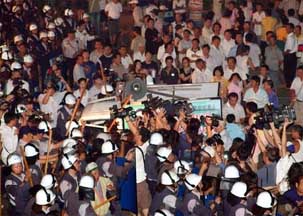
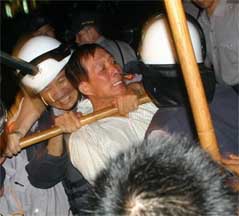

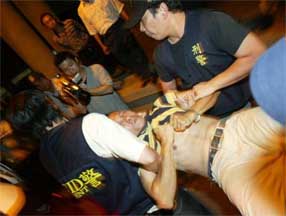

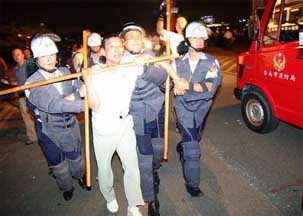



(Apple
Daily) Yesterday, about 300 people participated in the
anti-Bian sit-in. There were 600 Bian supporters chanting and
yelling. There were also many spectators. The police had 1,400
officers at the scene. At around 910pm, the poilce began to take
action against the Bian supporters on the plaza west of the Tainan City
government office. The assistant of a DPP city legislator attempted to
ram a sound truck at the anti-riot police line, but he was pulled out of the
car and arrested along with several others who used violence against the
police. At 945pm, some Bian supporters began to aim fireworks at the
anti-Bian area. The police began another round of crowd dispersion and
arrested six persons. The crowd eventually dispersed after 11pm.
Overall, one Bian supporter and one police officer were injured.
Twelve persons were arrested, all of them Bian supporters.
(Apple
Daily) Meanwhile in Taipei, the police have reviewed and they
have locked in on ten people who were suspected of engaging in violence
previously (such as vandalizing the television broadcast facilities and
attacking media workers). Of the ten people, four have already been
identified and the police are asking the public to look for the other six
persons:



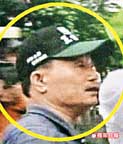
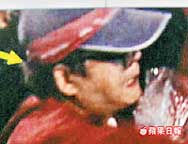

Here are the respective charges on these individuals (1) unplugging the CTV
TV broadcast antenna; (2) assaulting Hong Kong's "Bus Uncle"; (3)
invading CTV TV broadcast booth; (4) grabbing the FTV reporter; (5) physical
assault on DPP supporter 歡喜婆婆歐怡伶;
(6) physical assault on CTI TV host Huang Peng-jen. There are green as
well as red supporters in there.
[073]
Hong Kong By The Numbers (09/22/2006) (Sing
Tao) (Lingnan University interviewed more than 800 adult Hong
Kong residents by telephone during September 11-16).
Q: Do you want to see more than one candidate in next year's Chief Executive
election?
A: Almost 80% said yes.
Q: If Donald Tsang is automatically re-elected (that is, without
competition), can you accept it?
A: Yes: 76.9%; No: 10%
Q: Do you support the re-election of Donald Tsang?
A: Yes: 67%; No: 8%
Q: Who would you choose in an election between Donald Tsang and Anson Chan?
A: Donald Tsang: 52%; Anson Chan: 26%.
Q: Who would you choose in an election between Donald Tsang and Regina
Ip? or Audrey Eu? or Alan Leung?
A: Donald Tsang is supported by 70%, with the other three between 6% and
12.5%.
[072]
Who Is Miss Yeung? (09/22/2006) (Ming
Pao) If this is a tabloid magazine or a Internet forum user
asking the question, then it is boring by this time (see Comment
200609#058) as the story is running out of steam. But this
time, there is a bizarre twist. You will recall that it all started
with a published separation announcement by Ng Ka-po, the wife of William
Tsang and daughter-in-law of
National People's Congress Standing Committee representative Tsang Hin-chi.
Yesterday, Ng Ka-po was interviewed in Vancouver by Sing Tao and suggested
that she was not the person who authorized the publication of the ad.
She even said: "I would like to ask someone just who this Ms. Yeung is
... I want to know who wrote that ad."
So Ming Pao now had to explain that the ad came via a large ad agency in
Hong Kong. Upon receiving the copy of the ad, Ming Pao contacted the
principal. In order to properly identify the principal, Ming Pao asked
the person to produce proof of identity, related documents as well as a copy
of the certificate of marraige. Ming Pao received the copy of the
certificate of marriage numbered 963xxx which showed the names of William
Tsang and Ng Ka-po plus other details (birthdates, addresses, occupations,
etc). The certificate was even witnessed by Tsang Hin-chi.
Furthermore, Ming Pao even confirmed it with the Tsang family.
As for the content of the ad, it was verified by the principal before
publication. So it is a mystery as to why Ng Ka-po said that she was
unaware that a Ms. Yeung was mentioned in the ad.
[071] Apple Daily Reports on NTSCMP.com (09/22/2006) (Apple Daily; see also Charles Mok)
(in translation)
Tycoon Li Ka-shing and his second son Richard Li may not coordinate with each too well in business, but they are unified against outside insults. A website critical of the Li's appears to have been blocked by Li Ka-shing's Hutchison Global Communications and Richard Li's Netvigator. The users of those two ISP's have been unable to access the website. The Office of Telecommunications Authority has received 24 complaints. The two companies both denied blocking their users from accessing the website. A Legislative Council member pointed out that there is suspicion of interfering with freedom of information flow and asked the government to investigate.
The website suspected of being blocked by the two large ISP's is ntscmp.com, which was started in 1997. The website uses sarcasm and humor to poke fun at social ills without being afraid of the rich and powerful. As such, it is relatively well-known.
The website owner George Adams stated recently on the website that some netizens claimed to be unable to access the website recently. After his investigation, it was found that only Netvigator and Hutchison users were affected. He suspected that those two companies were blocking the website and called for netizens to complain to the OFTA.
Netizens were outraged by large financial groups blocking independent websites. Many well-known blogs such as Mister Bijou and EastSouthWestNorth have commented on this case, and the local website InMediaHK has also reported on this. The HK Golden discussion forum carried heated responses, with people saying that this is the typical Li style. But there were also users of those two companies who claimed to be able to access the website. Our reporter tested yesterday with Netvigator and Hutchison, and failed to get on.
George Adams told us that he checked his computer and server and both were working normally. Furthermore, netizens outside of Hong Kong were not affected, so the two ISP's are the most likely culprits. He has inquired at both ISP's. Netvigator said that everything is normal while Hutchison has not replied. He said that his website uses humor mostly to comment on the Li's without being malicious. The most recent creation is a collage of photographs that referred to Richard Li as a "twat," and that may be the cause for the blocking. He also described this affair as "disgusting censorship."
Both Netvigator and Hutchison have denied blocking their users from visiting anti-Li websites. They said that some users can visit that website normally. The OFTA has received 24 complaints so far, and the OFTA spokesperson claimed that if ISP's deliberately block information flow against the law, the highest penalty is a fine of up to HK$20,000 and two years in prison.
Charles Mok, Chairperson of the Internet Society Hong Kong, said that he heard about the case and preliminary investigation showed that several Hong Kong ISP's have encountered similar situations for unknown reasons. "It may be that the ISP filtered the information, but another possibility is that there is a problem with the website itself." He said that it is easier to trace from the server side. Fan Kwok-fai, executive director of the Hong Kong Information Technology and Network Engineers Association, said that ISP's can easily block users from visiting certain websites and it is hard for third parties to do so. However, the actual situation can only be determined after investigation.
Sin Chung-kai, Hong Kong Legislative Council member and chairman of the committee Information Technology and Communication Affairs, pointed out that the incident involves possibly restraint on the free flow of information and the authorities should investigate it quickly and prosecute if appropriate. "If blocking combined.
[070] The Duke Speaks (09/21/2006) The Hong Kong blogger known as The Dukedom of Aberdeen provides an update on the NTSCMP affair. To me, it shows why that particular blog was listed in Hong Kong Media At Crossroads as exemplary.
[in translation]
(update on September 21)
During the day, I tried to use Netvigator to access ntscmp.com. Failure. This evening, I went home to Aberdeen and use i-cable to access it. Success. Before coming home, I had dinner with a friend who said that he tried it with Netvigator at work and he succeeded.
Based upon the above results, this thing does not seem to be the result of censorship/blocking. On the contrary, there seems to be a problem with that website that made it impossible to go there. I found a tool known as Mutliple Traceroute v0.96 which can test the routes from places from all over the world. I started off with Telstra (203.50.2.177) in Melbourne. Failure. Next, I started from Finland's Center for Scientific Computing csc3-infor-a (193.166.0.1). Failure.
It would seem that more than Netvigator users cannot access ntscmp.com. Did ntscmp.com fool us? I don't know. I don't particularly like to clear Netvigator, but I must respect the facts. The facts are that there is insufficient evdience to support what ntscmp.com says on its website:
1. No one can access ntscmp.com using Netvigator or HGC in Hong Kong.
2. Every other server can access ntscmp.com.Those two points do not correspond to reality.
EastSouthWestNorth recommended that Netvigator (and other ISP's) state clearly that they will not block any website. I believe that it is obviously a wonderful thing for the ISP's to say so. But from the position of Netvigator, this highly visible statement will cause the mainstream media (such as newspapers and radio stations) to report and therefore lead to more people going to ntscmp.com, which is perhaps what the Li's do not want to see. Presently, if there are only a small number of bloggers discussing this subject, it may be more advantageous for them to do nothing.
I do not have a firm position on this matter. If this was a false alarm, we may be somewhat at a loss. But in the end, we must respect the facts. Perhaps I am wrong, and I hope someone will point out my mistake.
But I want the ISP's to know that people care about freedom of speech and information. I care.
(in translation) As far as I can tell, most local Hong Kong blogs are personal blogs. So who is worth the most amount of money? I tested several relatively more popular blogs at this website and here is their ranking:
1.東南西北 $1,296,658
2.港燦筆記 $827,837
3.聞見思錄 $475,566
4.通寶日記 $101,278
5.PK_日記 $88,070The top-ranked EastSouthWestNorth has a "market value" of $1.2 million. At a conservative return rate of 7%, there is a monthly income of $7,500. That does not mean that you don't have to work anymore because it is going straight into your pocket from the buyers. The condition is that you must keep on writing. But if someone offers this price, should you sell? Based upon the current circumstances, even if you outsource to Google to sell ads, it will be hard to make $7,500 per month. Therefore, it would be worthwhile. But the amount is not that big. If you don't need money right now, you can wait because the space for development may be bigger than currently.
Related Link: 港燦筆記值 $827,837 ?????? 港燦筆記
(in translation) It would not matter how much you offer this blogger. I have no intention of selling ads here. Besides, if you write in Chinese, the Google ads will only be "public interest" ads. I don't think that I am good enough to publish a book of collected essays or write a newspaper column, and I have no intention to do that. I write this blog purely to for mental rest/masturbation.
[068]
The NTSCMP Affair (09/21/2006) What shall I say except
that I am quite confused about what is happening? Unwittingly, I have
found myself in the middle of an Internet storm in which I do not possess
precise information.
The whole matter began with this post at Not
The South China Morning Post:
We are now no longer viewable via Li Ka Shing owned PCCW Netvigator or Hutchison Global Communications Broadband servers (the former being the biggest Internet service provider in Hong Kong) but are freely available via HK public libraries and on other HK servers, and in the USA and in the UK for certain. Was it the (Li Ka Shing supermarket chain) Park N Shop ripoff references or the lovely pic above of PCCW/Netvigator Chairman Richard Li which threw the switch on us? We apologise for this hiatus in the delivery of your NTSCMP. Thank you for your kind messages of support. Dr George Adams, for NTSCMP.
The Park N Shop reference was based upon this photograph in which the bottle of a cheap wine was marked dowm from HK$45.00 to HK$44.90. Wow!
So did PCCW Netvigator ban NTCMP.com as a result? I'm not sure. For a while, I could not access NTSCMP.com as a i-cable.com user. Had PCCW Netvigator really banned any website in Hong Kong, I am positive that i-cable.com would have taken out full-page advertisements in newspapers to say that they would never do so. This is because the Hong Kong ISP market is highly comeptitive in Hong Kong and they will seize on any comeptitive edge (see Travellers' Tales). So perhaps there is a technical glitch that affected some or all the Hong Kong ISP's.
As uncertain as I am about whether there is a real story here, as opposed to some Internet-related technical issue beyond the control of PCCW Netvigator, I observed that the Internet is responding:Global Voices Online: Hong Kong (China), Freedom of Speech, Internet & Telecoms:. "An alert posted by Mister Bijou on PCCW (biggest telecom in HK and ISP netvigator) decision to filter out a website called ntscmp. ESWN picks up the story and urges Hong Kong blogger to test the filtering."
Global Voices Online: Hong Kong: GFW in HK?
Mister Bijou: Part 1, Part 2, Part 3, Part 4, Part 5, The NTSCMP Affair, The NTSCMP Affair: Final Words.
Flagrant Harbour Is Netvigator censoring NTSCMP?
And I seemed to have pushed this issue onto some A-list bloggers in the Chinese-language blogosphere in Hong Kong:
香港ISP也有網絡封殺? 船山筆記
Some thoughts on ntscmp affair 船山筆記
我不清楚,但我也關注 香港仔公國
香港的GFW? Just A Sidekick
李澤楷法中共封網站乎? Letters from China
電訊盈科查禁搞笑網站 InMediaHK
長和系 GFW 疑雲 Perspectives from cubicle
NTSCMP事件簿 Just a SidekickPlus the HK Golden Forum.
Now I am probably as confused as they are about what is happening. Let me put it this way, irrespective of the technical aspects. Here are the facts: If you are a Netvigator user, you may not be able to access the NTSCMP.com website. Why? This may be either because Netvigator blocked that website or because it was due to an upstream technical glitch beyond the control of Netvigator. But users of other Internet service providers do not seem to have such problems.
Given sufficient coverage of this story in the Hong Kong blogosphere (and I invite everybody to attempt the exercise to access NTSCMP.com and report the results), Netvigator will eventually have to respond to the public opinion wave (and I am sure that Apple Daily and others will pick this up if enough bloggers mention this issue). For one thing, Netivigator may claim that they did not ban NTSCMP.com and the matter was due to a technical glitch upstream beyond their control. Fine. However, I would like to see an unequivocal statement from Netvigator (as well as all other Internet service providers in Hong Kong) that they would never ban any website. PERIOD. That would mean accountability and progress. This is a very low bar -- just say that you didn't do it and you won't do it. How hard can it be? Why do you have to wait until every Hong Kong blog is talking about this?
Conversely, if Netvigator fails to clear this very low bar, what does that say?
[067] The Tainan Videos (09/21/2006) In Comment 200609#062, I was talking about how it was only a matter of time before the videos of the assault on the lady in the red car would appear on YouTube for the whole world to see. Here are several televised clips forwarded by Sun Bin. The current media slogan is: "The whole world is watching." In these videos, you can watch how green supporters assaulted a female anti-Chen Shui-bian protestor in a red car. This is the sort of thing that you will find that Taipei Times and the green bloggers have little or nothing to say about, even though this is on CNN.
- CTI TV 挺扁暴民攻擊無辜女駕駛轎車
- TVBS 919保扁民眾暴力砸車事件
- 919暴力民進黨&貪腐政府/綠色暴民當街砸車
- 919暴力民進黨&貪腐政府/高雄11位綠色暴民現形This incident has much more significance than a pure local mass incident. This is about the survivability of Premier Su Tseng-chang (蘇貞昌), who had emphasized that he would leave if public security does not improve within six months. What does that mean? Here are the TVBS public opinion poll results on the public security situation in Taiwan:
March 20, 2006:very/somewhat satisfied: 15%
May 19, 2006: very/somewhat satisifed: 17%
July 21, 2006: very/somewhat satisfied: 19%
August 25, 2006; very/somewhat satisified: 20%
September 12, 2006; very/somewhat satisfied: 19%Of course, Su Tseng-chang runs his own poll which shows that people are satisfied with the progress. Fine. They can argue about polling methodology from here to eternity. But these video clips do not encourage confidence that law and order are being maintained in society. After viewing these video clips, the question has to be: Where were the police? They were obviously nowhere to be found. And then you have the choice: Incompetence, indifference, abeyance or acquiescence?
Fortunately, Su Tseng-chang has a savior in the no-nonsense National Police Agency Director-General Hou Yu-ih (侯友宜), who looked to be mad as hell. Personally, I am inclined to trust him on account of this press conference photograph plus what he said.
(TVBS) Pursuant to the events recorded in these video clips as well as other recorded incidents, Hou has issued major demerits to six senior police officials in Kaohsiung and Tainan who had direct responsibility for what occurred. Based upon what Hou observed, it was unacceptable that only three individuals were apprehended after the fact. Without exaggeration, the sanctions imposed by Hou were unprecedented. And Hou warned the police commanders at Tainan and Pingtung where similar anti-Bian sit-in's are scheduled to take place soon that these types of incidents had better not occur again. The whole world is watching.
[066] The Future of the Democratic Progressive Party in Taiwan (09/21/2006) The following is a partial translation of an opinion piece that was published in Next Weekly (issue# 863, September 21, 2006, page 152)
As everybody knows, the anti-Bian wave sweeping Taipei has now spread across Taiwan. When the Democratic Progressive Party candidate Chen Shui-bian defeated the KMT-PFP alliance in 2004, no one could have imagined that the promising DPP/CSB team would be stuck in such a serious crisis today.
Actually, this writer can appreciate why so many people in the green camp are marching in the streets. These people had experienced the heavy-handed KMT rule and the years of power-money politics. When a democratic political system was finally introduced, DPP/CSB ascended. Thus, the supporters of CSB hold great hopes for him in the belief that a new team will strike hard at "black gold" and create a new environment. Instead, there was a series of scandals connected to the family of CSB. It is therefore easy to imagine the disappointment of the people of Taiwan. Actually, it was even more disappointing to the people of Taiwan that CSB would try to hold on to his power and position and refuse to resign. This was what led the people of Taiwan to go into the streets to carry out this tremendous anti-corruption Red Revolution.
Due to the CSB effect, the DPP's accomplishments built over 20 years are being ruined in one blow. It is expected that they cannot reverse their situation in the upcoming presidential, mayoral and legislative elections. Given the way things are, what can the DPP do next from way down in the abyss?
In order not to hurt the whole society as well as the DPP, CSB has only one road in front of him. That would be to resign in order to calm the storm. When Annette Lu becomes president, she can use the remainder of the term to push through reforms to clean out "black gold," as demanded strongly by the people. For example, this may entail the establishment of an independent judicial agency in the manner of Hong Kong's Independent Commission Against Corruption (ICAC) and to actively improve the rule of law in Taiwan. ...
For the sake of both Taiwan and the DPP, the DPP leaders had better wake up. The problem in front of them is not whether CSB can hang on until his term ends in 2008. This is about the survival of the party itself. Therefore, instead of continuing with those quarrels that are disrupting social stability, it is better for them to stop the problem from getting worse and concentrate on saving themselves ...
Read the text and react to it accordingly -- based solely upon the text itself. You can agree or disagree with the writer, and you can even call him a Communist dupe/shill/hack if you want, because this is what the Chinese Communist shills are saying in China Times and United Daily News.
I did not tell you who the writer was. Do you think that should make a difference in how you respond? Obviously, I thought some of you might and that was why I did not tell you. If you really want to know, you are going to have to research it yourself (Next Weekly (Hong Kong), issue# 863, September 21, 2006, page 152). Then you may have to reconcile your initial response with respect to the identity of the writer.
[065]
Who Is Ms. Yeung? (09/20/2006) Concerning the notice of
separation by the wife of William Tsang on the culpatory role of an actress
named Yeung in ruining the marriage (Comment 200609#058), there are some
developments. The press finally got to speak to William Tsang himself
(see Apple
Daily). He denied all. He said that his wife wanted the
divorce via a lawyer's letter on the grounds that they had lived apart for
more than one year and there was no third party.
Reporter: Do you know any actress named Yeung?
Tsang: Charlie Yeung. The reports mentioned that. She is a
friend of my younger brother. I met her three years ago. I know
her ex-boyfriend. I met her once or twice. We are not even
ordinary friends who nod to each other.
Reporter: What about Kristy Yeung and Yeung Yuk-mui?
Tsang: I don't know them. I do not have a lot of contact with the
film or entertainment industry. I have asked Joey Yung and Twins to be
the ambassadors of goodwill for public causes. I don't have the
telephone number of any Hong Kong actress, with the exception of Vivian Lai
(the wife of my younger brother). I never had any, and I don't have
any now. I don't have any since I grew up on Hong Kong.
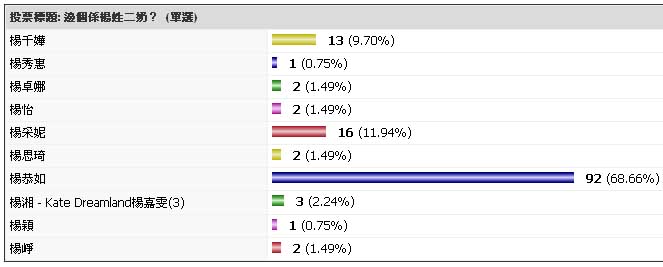
Meanwhile, at Discuss.com.hk,
the Internet poll has 92 votes (68.7%) for Kristy Yeung, 16 (11.9%) for
Charlie Yeung and 13 (9.7%) for Miriam Yeung.
(Apple
Daily) Kristy Yeung was mobbed by reporters and she said:
"It wasn't me! What can I do? My last name is Yeung, but I
don't know him. Have you reporters solved the case yet? I want
to know who it is too ... Since my series is about to go on air, this can be
considered promotion."

[064]
Beijing Times Reports On Itself (09/20/2006) (Beijing
Times via Sohu.com)
In the Fengtai district, there was a fire in a truck near a market for
construction materials.
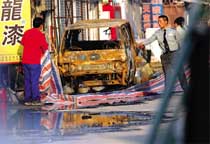
When the Beijing Times photojournalist Xu Yin (徐胤)
arrived at the scene, some men and prevented him from covering the
incident. The men assaulted Xu and wrecked his camera.
Mysteriously, another photographer was able to take photographs of the
assault and these were published in Beijing Times.

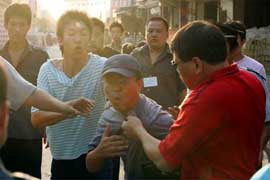
Two of the men (the red-shirted man wearing sunglasses and the man with the
white-green striped shirt) have been identified as a result. The
market has compensated the reporter for the damaged camera.
[063] My Young Brother Ching Cheong (09/20/2006) (Ming Pao via New Century Net). By Ching Hai (程曦). September 19, 2006.
[in translation]
Late last September, we received permission to go to Beijing to visit Ching Cheong for the first time.
I have not been to Beijing for several years. There are more large buildings and the cars on the roads flowed non-stop, indicating that the materialistic civilization of this city has risen. But our hearts were heavy as we remembered Ching Cheong who had been detained for several months already. The superficial bustling scenes cannot lessen the worries in our minds.
Per arrangement, we went to the outside of the Ministry of National Security building at Jianmendongda Street and we met the case investigator to take us to the detention center. We arrived there by car half an hour later. We went into the reception room, we were processed and the workers led us to the interview room. The room was partitioned into two halves by glass. There were were several chairs on our side and a microphone. Several minutes later, the guards brought Ching Cheong in. I had not seen him for almost six months. He was a lot thinner and looked sallow and sluggish. I suddenly realized that he looked so much like our dad, who was ill and bed-ridden at the time. Cheong saw us, he got excited but he kept himself under control. He thanked us for traveling so far to visit him and then he added this sentence: "I blame myself for loving China too much, and therefore causing trouble for everybody (都怪自己中国情意结太深了,连累了大家。)." Tears began to flow from my younger sister. We all wanted to ask him what happened, but the detention center told us beforehand that we cannot discuss the details of the case. So we could only talk about what happened to everybody since we last saw each other and we ask each other to take care. The half-hour period went by in this restrained and sorrowful atmosphere.
The next time that I went to see him in Beijing was more than two months later. It was a lot colder in Beijing and the temperature was several degrees below zero. We wore overcoats and we shivered while we waited at JIanmendongda Street for the case investigator. This was the third time that I met this man, but I never found out his name. I have asked him several times, but he never told me. Perhaps his name is a secret.
Ching Cheong was still sallow and thin, but his spirit was better. He started again with an apology to us and then he sighed that he loved China too much. I imagined that he must be reflecting on this issue nowadays. I appreciated that this open and upright man must have suffered insults. It caused him grief to experience the deep significance of "You love your nation, but does your nation love you?"
Later Ching Cheong sent word through his lawyer to ask us to trust that he did not do anything against his conscience or damage the nation. He hopes that his family can understand him and not feel bad for him.
As family members, we cannot imagine how an experienced reporter on mainland news could fall into this abyss. We have good intentions, we hope that it was just a misunderstanding and he could come back soon. But one day becomes another day, one month becomes another month and he has not returned yet. During this period, many friends and fellow journalists publicly spoke out for him. The alumni at Hong Kong University formed the Ching Cheong Concern Group to fight for fair treatment for him. Cheong's employer never wavered from supporting him. We are grateful from our hearts for all the care and help ...
Related Link: Brother gives glimpse of Ching's patriotic side. Jonathan Cheng. The Standard. September 20, 2006.
[062]
Red vs. Green in Tainan (09/20/2006) The videos will
appear on YouTube soon enough, but here is the TVBS
still images of a woman in red driving a red car trying to leave the site
and was surrounded by Bian supporters who threw rocks at the car, kicked at
it, banged on the car hood and smashed the windows.
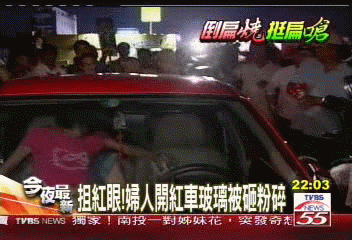
[061] Still Life (09/20/2006) (Southern Weekend) From Jia Zhangke, the director of the winner of the Golden Lion award at the Venice Film Festival for the movie Still Live.
[in translation]
... "The Good People of the Three Gorges (三峡好人)" has an English title of "Still Life." The movie is divided into four sections: tobacco, wine, tea and sugar. These four things are not only part of the narrative, but they are also the most basic materials that the Chinese people depend on and derive pleasure from. For example, we saw many families at the Three Gorges which are materially deprived. Sometimes, we discover certain things on their window sills or desks which have not been touched for four to five years. The objects are very silent and carry the stamp of time. That is when I felt that filming the lives of the most ordinary people in China is like filming a still life so that the reality that people are ignoring can be brought out by a film.
Obviously, the re-location of the people to make way for the Three Gorges construction brought changes, but I am touched by how after the tremendous changes, they were able to generate a life force under difficult circumstances, a life force that everyone from children to old people have. I do not wish to give an assessment on the project itself. The project is now a reality, and any assessment is meaningless. It is more meaningful to show that people's lives were affected and that, under these circumstances, they still maintain a vibrant life force.
[060]
Taiwan By The Numbers (09/19/2006) (TVBS via Yahoo!
News) (938 persons age 20 or older interviewed on September
18).
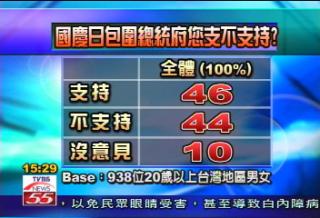
Q: Do you support Shih Ming-teh's anti-corruption campaign?
A: Yes: 55%; No: 30% (note: this is 5% lower than the previous poll).
Q: Do you support the next action of surrounding the Presidential Office
Building on National Day (October 10)?
A: Yes: 46%; No: 44%.
[059]
Book Banning in China (09/19/2006) (Ming
Pao) That is to say, you assume that you know when a book is
banned and sometimes it is not clear.
There is presently a dispute between Chinese author Yan Lianke (阎连科) titled The Dream Of Ding Village
《丁庄梦》
(see Discussion of Two Novels About Blood Selling)
and his publisher Shanghai Literary Publishing. Under the terms of the
contract, the publisher should have paid the author's fee in three
installments 3 months to 12 months after the publication, together with a
donation of 50,000 RMB to the AIDS village in which the book was
researched. According to Yan, these terms have not been
fulfilled. Since this affects the interests of AIDS sufferers as well
as personal reputation, Yan has filed a lawsuit in Shanghai.
The Ming Pao reporter received an email from Shanghai Literary Publishing
stating that "the subject of the book was very sensitive. As soon
as it was released, we received an order from above: Do not distribute, do
not market, do not promote. Therefore, the publisher ceased sales
immediately. All media in China must follow the orders from the
General Administration of Press and Publications and cease any reporting on
this book, positive or negative." But the Ming Pao reporter went
to a Beijing bookstore yesterday and found the book was still being sold.
[058]
Who Is Ms. Yeung? (09/19/2006) (Apple
Daily) In Hong Kong, an extraordinary newspaper ad appeared. This is a notice of separation by the wife of the son of
National People's Congress Standing Committee representative Tsang Hin-chi, and she is serving
notice of separation because her husband is involved with a female artiste
by the name of Yeung. She thanks her relatives for their concern and
her father-in-law for his support. Under Hong Kong law, a public
notice is not required in this circumstance.
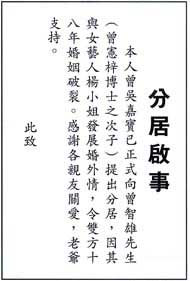
This meant that the whole city is abuzz with the identity of Ms.
Yeung. Charlie Yeung? Kristy Yeung? Yeung Yuk-mui?
Miriam Yeung? Michelle Yeow?
They have all been quizzed by the press and issued denials. Kristy
Yeung added, "It is unfair. She should have not spelled out the
full name."
[057]
A Case of Hong Kong Internet Censorship (09/19/2006) Global Voices
Wiki: Hossein Derakhshan (aka. Hoder) proposed three models for ways people can use weblogs to communicate between cultures: windows, bridges and caf�s
... Bridges are more interactive than windows, but less complex than caf�s. They're usually the project of a single blogger, or a small group of authors. Bridge bloggers write for an audience outside their everyday reality.
Hong Kong is a multi-lingual world in which the blogosphere is separated by
language. It is up to the few bridge bloggers to facilitate
communication. On this day, I posted a recommended reading: Hong Kong: Internet censorship by
Mister Bijou (see update
too). This has been a cause c�l�bre
in the English-language blogosphere about how the webiste NTSCMP (Not the
South China Morning Post) has apparently been blocked by certain Hong Kong
Internet service providers (note: I use i-cable and I don't have a problem).
The blogger at the Chinese-language blog 船山筆記
followed my link and confirmed that he was unable to reach NTSCMP through
his ISP Hong Kong Broadband (which is not even one of those previously
identified), but the proxy service works. His comment: 若然這次網絡封殺事件屬實,
認真非同小可.
(in translation) "If this Internet blocking incident is factual, this
is a big deal." If this finding permeats through the
Chinese-language blogosphere, it would be much more potent due to the bigger
numbers, and then the Chinese-language mainstream media may pick this up
since they monitor the Chinese-language blogosphere very closely.
If you are in Hong Kong, I would urge you to try the experiment of accessing
ntscmp.com; if you can't gain access, try the proxy service. You can
blog about your experience and you will be part of the public opinion
pressure that the mainstream media respect nowadays.
Update: I've also lost the ability to reach ntscmp.com through
i-cable. When I run a tracert on it, the problem is not with
i-cable.com but something is happening either in North America or on the
way back from North America. However, the
proxy service works for me.

Update Again (6:30pm, Hong Kong time, September 19, 2006) I can
get to NTSCMP.com again via i-cable.
[056]
Errata (09/19/2006) In Taiwan By The Numbers,
I noted that the 9/15 march organizers claimed 750,000 (and up to as many as
1 million) participants while the Taipei City police estimated 360,000
particpants. Therefore, I concluded that Taipei Times misled with a
headline of "tens of thousands."

I was wrong.
The 9/16 demonstration organizers claimed 250,000 participants while the
Taipei City police estimated 55,000 participants. The Taipei
Times
used the headline of "thousands." Therefore, according to
the Taipei Times style sheet, 360,000/750,000 means "tens of
thousands" while 55,000/250,000 means "thousands." I
stand corrected for implying that Taipei Times was biased in any way.

Appeller un chat un chat can't be too hard, eh?
[055] Defining the Internet Mob (09/19/206) (China Youth Daily via MediaChina.net)
According to an online study conducted by China Youth Daily and QQ with 3,226 participants, the typical characteristics of a member of the Internet mob are:
62.6%: A person subjectively wants to suppress others
57.4%: A person employs filthy and abusive language
56.8%: A person discloses other people's personal details without approval by the principals
54.3%: A person threatens the personal safety of the principals
48.2%: A person questions the moral quality of the principals at each step
44.8%: A person blindly follows others' opinions
[054]
The Case of Zhou Zhirong (09/18/2006) According to the 64Tianwang
website, Hunan human rights activist Zhou Zhirong has been arreted by the
public security bureau. According to a friend, Zhou has been charged
with numerous offenses, mainly about inciting people to petition and assault
the Party and the government, disseminating lies to create social
instability and to distribute large numbers of essays attacking Party and
government policies.
64tianwang mentions that Zhou Zhirong's alert about "Yesterday, the
Yueyang (Hunan) armed police killed more than one hundred migrants!"
was widely disseminated on almost all websites. You can read the
translation of his announcement at the beginning of The
Great Xiangyin Massacre, along with all the other material on the
case. Zhou has never commented on his original post or reconciled it
with all the other reports (including local eyewitness reports on Internet
forums, official Xinhua reports and overseas media reports).
[053] Name Brands (09/18/2006) (Wenxue City)
(in translation) It is evening on Nanjing West Road in Shanghai. The street lights are shining on the Louis Vuitton flagship store. On the 2nd floor of the store, a woman was paying for 16,000 yuan LV handbag with a credit card.
Several minutes later, she is standing at the bus stop. Like most ordinary Shanghai citizens, she takes buses and the metro subway for her daily transportation. At that moment, you would imagine that her LV handbag had cost her four months of salary. There are many women like her, making only 2,000-3,000 yuan per month, but they will take six months of their earnings to buy an LV bag, and then use it wihile going to work on a public bus.
For foreigners living in Shanghai, this is an incomprehensible story. In their eyes, people who can afford to buy LV handbags should have houses plus luxury cars driven by chauffeurs. But it is precisely this type of mindset that has made a luxury brand like LV so popular in Shanghai.
Do not imagine that LV (or any other luxury brand) actually appreciates these kinds of adulation. This sort of talk cheapens the brand and dilutes the brand equity. Your only defense is to mark up the price of the product even higher (as in, it'll cost two years of ordinary wages and it'll go out of fashion in six months).
In Hong Kong, in the case of The Bleeding Barrister, barrister Chu Tak went to a Tsim Sha Tsui hotel with two girls and got a room. Then an ambulance had to be called because he was bleeding in his private parts. Chu said, "Blood started to pour out of my dick like water from a showerhead. I was not scared, but the girls were and insisted that I be taken to the hospital." At the hospital, he created a commotion by calling his companions "chickens." The above photographs showed the two girls coming out of the ambulance. Can you identify the brand name of their handbags? Would you be caught using the same brand as these "chickens"?
Additional Reading: The Evil Woman With The Gucci Bag
[052]
The Battle of Taipei (09/18/2006) Apple
Daily has the shooting death of a suspect in Taipei on the front
cover.
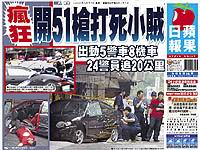
The suspect was a 42-year-old man fleeing in a car. He had a prior
record that included illegal possesion of firearms, extortion, burglary,
robbery, interference with public duties, narcotics abuse, etc. At
midnight yesterday, the suspect appeared at a coffee shop and threatened a
foreign couple with a gun. Other citizens called the police and
reported the license number of the vehicle. At 8am, the suspect was
reported to be stealing bamboo mattresses from a furniture store.
The Taipei County and City police mobilized 24 police officers in five
police cars and 8 motorcycles to chase the suspect over 20 kilometers.
When the car was finally stopped, the police fired 33 shots and hit the
suspect with six shots. The suspect was dead on arrival at the
hospital. All told, including warning shots, the police fired 51
shots. The suspect was found to be unarmed. A search of the
suspect's family home revealed that there was a toy gun (plus the glue that
he might have been sniffing).
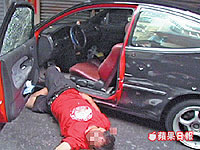
None of the above is able to really communicate what happened during the
case, especially with respect to whether this was justified use of
force. You should really watch this FTV
news report (WMV format) based mostly upon the video taken by the
FTV chase vehicle. The shots fired
by the first police officer were directed at the car tires and clearly
intended to disable the vehicle. Also, pay attention to the close-circuit television
clip taken from the store near the end of the report. The action of this traffic police officer
outside the store is much more difficult to justify, since he was just
standing there handing out a traffic ticket and he began shooting as soon as
the suspect's car came by. Did that police officer know enough about
the situation to be shooting at a moving target in a public place with other
people around?
P.S. Apple Daily does not say, but the FTV report refers to the
suspect as shouting anti-Bian slogans and wearing a red anti-Bian t-shirt.
[051]
Taiwan By The Numbers (09/18/2006) (China
Times; China
Times)(survey of 1,167 persons between September 13-15 using the
Taiwan telephone as base and randomizing the last two digits).
Q1: Do you believe President Chen should leave his post?
Yes: 72.1%; No: 27.9%
Q2: Do you know about the silent sit-in at Ketagalan Boulevard organized
by Shih Ming-teh?
Yes: 97.7%; No: 2.3%
Q3: The Ketagalan sit-in has been going on for more than one week.
What is your assessment of its value?
Positive: 64.6%; Negative: 30.6%; Both: 4.8%
Q4: If the sit-in continues, what is the negative aspect that most
concerns you?
- 31.9%: concerned about violent clashes
- 25.9%: concerned about economic impact
- 12.6%: I have no concerns
- 8.0%: impact on traffic
- 7.8%: impact on peace in the surrounding area
- 6.6%: concerned about everything
- 6.3%: setting bad example for children
- 0.9%: no opinion
Q6. If the sit-in continues "indefinitely," will you support it?
- Support: 50.8%; won't support: 47.5%; no opinion: 1.7%
[050]
Taiwan By The Numbers (09/17/2006) (United
Daily News) (Public opinion poll conducted on evening of September
16, 2006 of 904 adults (375 refusals) using telephone directory with last
two digits of telephone number randomized).
Support of anti-corruption/depose Bian movement:
42%: August 12 (when Shih Ming-teh began the campaign)
44%: September 5 (before the sit-in in front of the Presidential Office)
55%: September 16 (after the "siege" of Taipei)
View on whether Chen Shui-bian ought to quit:
37%: May 25 (when Chen's son-in-law Chao Chien-ming was detained)
51%: August 12 (when Shih Ming-teh began the campaign)
59%: September 16 (after the "siege of Taipei)
(Apple
Daily) (654 adutls interviewed on September 16, 2006 via
automated telephone dialtone interviewing)
Which television channel is most fair and balanced on the
anti-Bian/support-Bian campaigns?
- 17.6% TVBS-N
- 17.4% FTV
- 12.2% CTI TV
- 12.2% Era
- 11.0% ETTV
- 8.9% Sanli
- 7.5% "They are all fair and balanced"
- 7.2% "They are all unfair and unbalanced"/don't know/no opinion
[049]
Attribution (09/17/2006) The 船山筆記
blog reminds me of a peculiar (and unethical) practice among Hong Kong
media. At issue is Hong Kong blogger/reporter Florence
Lai, who worked very hard to come up with the story that Hong Kong's
program to attract exceptionally talented immigrants drew an application
from internationally renowned Chinese pianist Lang Lang (郎朗).
Whereas the whole concept of the program was an object of scorn, it is now
all of a sudden functional in a media-worthy sense.
What happens next? Oriental Daily and The Sun both picked up the Lang
Lang story while mentioning that the information came from a "certain
local magazine." Thanks a lot! Then the Chinese newspapers
in Guangzhou (and even Lanzhou) picked it up, and even the esteemed Xinhua
agency said that Lang Lang confirmed that he filed an application in an
interview with "a Hong Kong magazine."
Oy! Florence Lai does not work for a "certain Hong Kong
magazine." In her blog post, Florence recalls how she used to do
that sort of thing once upon a time and her boss would always catch her:
"Florence, where did you get that from? All news must have
attributed sources!"
In media history, according to the Wisenews database, the original source of
this Lang Lang story will be unknown except through her blog post!
[048]
More Ammunition for Hate ESWN Folks (09/17/2006) At the
Beijing Bookworm panel, the first question that popped up was about whether
I ever encountered any pressure with respect to my blog and whether I had
ever been contacted by the Chinese authorities. The answer to the
second part was categorically "NO." I reside in Hong Kong
most of the year, and I have no contact with mainland Chinese authorities
ever. The answer to the first part is also categorically
"NO" as well, but I gave a more detailed answer: "I write
this blog for myself. If I should ever starting thinking that I ought
to write this thing or not write that thing in consideration of other
people, then I really ought to quit." Anyway, this OhmyNews
report should give some people the ammunition for hating me even more.
So what? I don't write what I write in consideration of what some
party apparatchik prefers, or what the Next Weekly publisher thinks, or what
some other blogger insists, or what some commentators at other blogs
demands. I write because this is my essence. This project is
over as soon as I start worrying about anyone or anything else. To the
extent that nobody expects me to edit or censor myself in consideration of
"social harmony," why would anyone expect me to succumb to some
blogger's notion of "fair and balanced" information? This is
simply not going to happen.
However, I'll issue a correction here. In Beijing, I attributed
Winston Churchill as the source of a certain quotation which was paraphrased
at the end of the OhmyNews article. Instead, the quote is from Cyrus Ching: "I learned long ago never to wrestle with a pig. You get dirty, and besides, the pig likes
it" (see Quotations).
[047] Left versus Right in China (09/16/2006) (TECN) In China, are the Leftists or Rightists in Power? Speech delivered at the Forum on Problems, Prospects and Possibilities. By Qin Hui (秦晖).
(in translation)
At Harvard University two years ago, an American scholar wondered: "In today's China, do the leftists have the upper hand? Or the rightists?"
I told him: "Following your standards, neither leftists nor rights have power in China. For you, your leftists are supposed to hold the rulers accountable; your rightists are supposed to limit the powers of the rulers. Both these types of people are being suppressed in China. But the Chinese rulers also prop up the types of leftists and rightists that they need. They need the 'leftists' to expand their power, and they need to 'rightists' to help them evade their responsibilities. So it can be said that in China, both 'leftists' and 'rightists' are being favored by the rulers."
This shows that when we observe China today, we cannot use the western "left-versus-right" dichotomy. It is regrettable that people often do just that.
Within the international scholarly community, especially in the field of international economics, there are all sorts of ideas about China, but the major ones fall into three types. The first one is the theory of the collapse of China. It is thought that the high economic growth in China was an artificially created illusion. Behind the scenes, the internal crises and the pressures of globalization are become more serious every day. Collapse is therefore unavoidable. The second and third ones are the opposite. It is thought that the Chinese economy has created a miracle in growth and prosperity. The two major camps among western economic scholars offer two opposite explanations. The traditional liberal economics attributed the "Chinese miracle" to the success of liberal economics or market forces, whereas the leftist economic or Keynesian scholars attributed it to "socialism" or government intervention and control.
I believe that all three of these mainstream ideas are seriously wrong. The fact is that China is maintaining its high economic growth while adapting nicely in globalization. Therefore, the "theory of illusions/collapse" is wrong. But this growth cannot be regarded as "the success of the government" as interpreted by the left-leaning scholars, nor as "the success of the market" as interpreted by the right-leaning scholars, nor does it have anything to do with the so-called "Beijing consensus" about the "combined success of market and government." Apart from low wages and low benefits, China is able to use its "advantage" in "low human rights" to push down the price of the four major factors (manpower, land, capital and non-renewable resources). The "cost of transaction is reduced" by prohibiting price negotiations as well as limiting or even eliminating certain trade rights. China rejects democracy, it suppresses participation, it pays no attention to ideas, it despises religious beliefs, it scorns justice and it uses materialistic stimulation to promote a single-minded desire to chase after the mirage of wealth. This was how it came to have an astonishing competitiveness seldom seen in open market or welfare states, and all the other liberalizing countries in the world that adopt either "gradual development" or "shock therapy" fall far behind China.
[046]
The Taipei Rally (09/16/2006) Here are the online front
page covers for six Hong Kong newspapers.
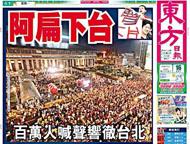

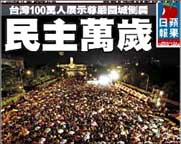

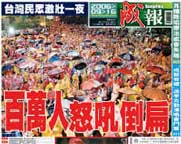
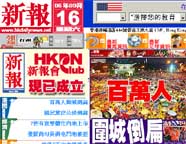
Here are the screen captures from the four major newspaper websites in
Taiwan.

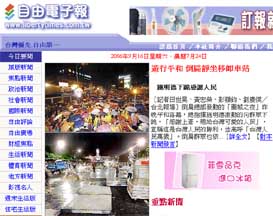

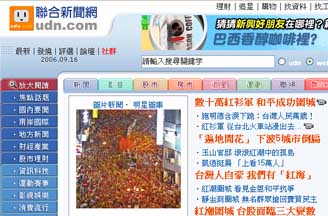
[045] Democracy Wins (09/16/2006) What is wrong with democracy (as in universal suffrage)? The most obvious flaw is that it rewards those who are able to win elections, but who are subsequently ill-suited and ill-equipped for their elected positions. Here is an egregious example from an election campaign (from Dalily Kos):
You would think a fourteen year incumbent Congressman would have a lot of positive things to say about his record in a reelection campaign. You would think an incumbent Congressman who claims he's in no danger of defeat would ignore his opponent. Not Peter King. He's kicked off his campaign with a campaign mailing that attacks me! ...
His letter uses an opinion piece in the New York Post to claim that I am being supported by the leaders of the Islamic Center in Westbury, located in the 3rd Congressional District, and that these leaders are Muslim extremists. Even worse, he targeted his letter to Jewish voters in the district, playing the fear card to try and strip away support from my campaign.
I wish I could say that's the worst of the story, but it isn't. Turns out, Peter King has taken contributions from the very same leaders of the very same Islamic Center. Let me break that down for you: I accepted contributions from three leaders at the Islamic Center in Westbury, and Peter King has attacked me for taking their money. The problem is, Peter King took their money too, and he even took more than I did! Peter King needs to explain why it's wrong for me to take money from Muslim donors, but OK for him to take even more from the same people. ...
Dave Mejias
Democratic candidate for Congress, NY-03Is this the way to elect the best representative in the legislative branch of the nation? The anti-dote is an informed and rational electorate. But how many of us have the time and energy to keep up with this nonsense, which is financed by gadzillions of dollars from special interest contributions?
[044] Speaking out under Rule of Law (09/16/2006) (Southern Weekend) By Lian Yue. September 15, 2006.
[in translation]
... In the name of rule of law, everybody likes certain clich�s. For example, media people often say: "Since the matter has entered into the judicial phase, we should shut up so as not to affect the judges' decision." I have always considered this to be a Chinese-style idiocy that pretends to have some resemblance to the spirit of the law. Precisely because the matter has reached the hands of the most important judges in a society ruled by law, we should speak up and use our certain viewpoints to influence the judges. If at this critical moment, you suddenly lose your voice and feel that speaking out will ruin things, you are disavowing your own role as citizen and you have no citizen spirt in a society ruled by law.
The fact is that in a society that is truly ruled by law, those cases that society cares about are more likely to be topics of heated discussion. There are many instances in which the passion of the public and the cold logic of the law are at odds. If the will of the judges can be swayed by others so that a legally incorrect decision is rendered in the face of public pressure, the fault is on the judge and not on the public. If the passion of the public is aligned with the spirit of the law, the public deserves the credit. When the public places a person in the important role of judge, he should have the ability to sort out the information and also the courage to adhere to the law even if it upsets the public. ...
[043]
Pick Your Own Headline (09/15/2006) It is midnight in Hong
Kong and your newspaper is almost ready to go to print. What will you
put on your front page? The two most obvious choices are (1) The
"Earthquake" in Hong Kong (well, actually, a Richter-scale 3.5
tremor that lasted 3 seconds); or (2) the detection in China of banned heavy
metals such as chromium and neodymium in SK-II skincare products.


Apple Daily chose the SK-II story while Oriental Daily chose the earthquake
story.
In terms of absolute number of people, the earthquake story probably drew
more readers. The Internet forums were awashed with earthquake-related
stories minutes after it occurred, even before the Hong Kong Observatory
made the official announcement. This is especially so since Oriental
Daily included a side-story of someone falling to his death, originally
positioned as a mainlander burglar climbing down from the roof along a pipe
and losing his grip when the tremor occurred. This was a sensational
story, with one drawback -- it is false.
However, if the purpose of the newspaper is to reach an audience that is
more desirable to advertisers, then the SK-II story will probably strike at
home with fashion/beauty-conscious women, many of whom used the SK-II
products.
But then again, it was a false choice between the two. You could
have it both ways, as in The Sun: earthquake on top section, SK-II
underneath.

[042] Globalization and Its Discontents (09/15/2006) Here is today's list of recommended photos/videos/readings:
- Video Uyghur Folk Song: Nazirkum The Opposite End of China
- Reading Situation Called Dire in West Iraq Thomas E. Ricks, Washington Post
- Reading 'To stand still is to fall away from the truth' Susan Sontag, The Guardian
- Reading 翠灣補選後記 大力灰狗
- Reading Failures of Imagination Eric Umansky, CJR
- Reading Why China's leaders should talk to the press Imagethief
- Reading 倒扁有感,兼懷至親 新春秋
- Reading Testament of the Death Squads Greg Grandin, CounterPunch
- Reading Afraid of the Phone Baghdad Blogging, NBC News
This list must drive my readers to distraction: Uyghur MTV; the lost war in Anbar province of Iraq; the diary of Susan Sontag in the Paris years; the district by-election in the Tsui Wan area of Chai Wan, Hong Kong; the delayed reporting on the Abu Ghraib torture prison; the presentation of self by Chinese leaders; a Hong Kong'er reflections on the anti-Bian campaign; death squads in Central America; media workers in Baghdad today. I know that you may want a simpler and compartmentalized world, but this is ME! And you will have to put up with that here.
P.S. How shall I tell you that in the previously linked 偉大的反共文豪, the mainstream newspaper columnist apparently showed up as a sock-puppet to defend his op-ed piece and was exposed in the 50th comment in this post?
The fact is that I am an individual person who lived in a place during a time when I am exposed to multiple levels of information, all of which affected me as an individual as well the society around me. How shall I not tell you about all these things? You may not think that some of these things are relevant to you. But trust me, they matter ...
[041]
Galie's Nipple (09/15/2006) More on the subject of
selective protests in Hong Kong against intrusion on the privacy of
performing artists. In this issue of Oriental Sunday, the question is
just why superstar Leon Lai is marrying starlet Galie Lok. The front
page features a photo on the hint of a tatoo showing on the edge of Galie's
dress.
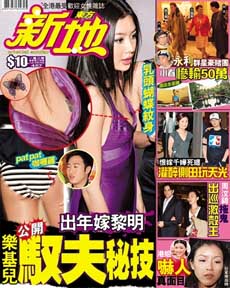
Oriental Sunday suggests that it was a butterfly tatoo right over her left
nipple that is driving Leon Lai insane! And they even have a
photograph of it (blurred, because this is not a Classification 2
publication (unless there are enough public complaints!)).

If Galie Lok did not pose for this photograph of her nipple, then it was an
egregious offense to make it up; if Galie Lok actually posed for this
photograph, then this is collusion to manufacture hype. Either way,
this was a disgrace and detrimental to the healthy development of young
minds (but also business-as-usual). Let us hear the media, the public
and the social groups complain ... NOT!
[040]
The Cultural Revolution Continues in Taiwan (09/15/2006)
This essay is drawing comments at overseas Chinese forums, so it is being
translated without comments here.
(Liberty
Times) If you don't go to Taiwan, you won't know that the
Cultural Revolution is still going on. By Lin Bo-hua. September
13, 2006.
[in translation]
There is a very popular doggerel in China: "If you don't go to Beijing, you won't know that your official position is so insignificant; if you don't go to Shanghai, you won't know that you have so little money; if you don't go to Hainan, you won't know that your body is in bad shape." Then a new phrase was tagged on: "If you don't go to Taiwan, you won't know that the Cultural Revolution is still going on." Previously, I did not agree with that because the Cultural Revolution was initiated by Mao Zedong and there is no one like Mao in Taiwan. But recent observations have led me to accept this phrase.
The Cultural Revolution was initiated by Mao Zedong in the name of "Culture" in order to bring down national president Liu Shaoqi. I have many thoughts about the Cultural Revolution, but the deepest two are: revelatory materials and mass dictatorship.
When Mao Zedong initiated the Cultural Revolution, he depended on the "Two Newspapers and One Magazine" controlled by the Communist Party: People's Daily, Liberation Army Daily and Red Flag. They published editorials and opinion pieces as well as the speeches from the Proletariat Command Headquarters, and these served as the opinion guide for the popular movements. When the "red signal" was sent out, there was a unified movement across the country and those named immediately became the targets of criticisms. The various levels of party organizations also offered the file information on the targets in order to protect themselves, and thus many local and departmental people were "swept" up as monsters and demons.
At first, the monsters and demons were known as the "five black types." This was later expanded to eight types. The government did not arrest them, but left them in society under the "dictatorship of the masses." The "five red types" dictated over them, forced them to march in the streets wearing placards, shaved their heads halfway, cursed them, beat them, spit on them and went to their homes to carry out the "revolution." When people visited doctors, the latter can ask about the "composition" and had the right to refuse treatment or medication to those tainted by blackness. The entire country was submersed in the red terror.
In order to encourage violence, the Chinese Communist leaders gave speeches such as "When good people attack good people, it is just a misunderstanding; when good people attack bad people, it is justice" and "attack with words and defend with force." The armed struggles increased the social division, the government was almost paralyzed and the economy was near collapse. By the time that Mao Zedong succeeded in seizing political power and formed the unification of the alliance of revolutionaries, the leaders of neither factions were accepted by the people. This led to the power being handed onto a neutral party (still subject to approval from above). The monsters and demons were eventually vindicated. The conclusion was that the events happened for cause, but there is no way to get to the details. So we can only blame whatever the cause may be.
The revelatory materials in Taiwan are rather like the "Doubt everything; bring down everything" during the Cultural Revolution. Anyone who supports Taiwan independence is attacked and must apologize, just like the "five black types." What kind of democracy is this? This type of populism is being manipulated by the Chinese Communists. Although Taiwan does not have a Mao Zedong, the shadows of the Chinese Communists are everywhere. In Taiwan, it was not easy to find a political figure such as Shi Ming-teh, who has never been to China. Therefore, he is a rarity. But during this entire movement, Chen Yu-hao and many pro-unification politicians, together with many performing artists and gangsters with China backgrounds, caused Shih Ming-teh to change colors. So the Cultural Revolution is coming back through Shih. But can Shih Ming-teh really assume power?
The Cultural Revolution created a huge calamity in China. The Chinese Communists had to sacrifice the glorious image of their grandmaster Mao Zedong and admit that the man made mistakes in his latter years. Since they knew that neither negotiations nor armed threats affects Taiwan, it created the Cultural Revolution to divide Taiwan in the name of "dump A-Bian" so that Taiwan will fall into a "vegetative state." But can dumping A-Bian satisfy the ultimate need of the Chinese Communist to take over Taiwan? The people and government of Taiwan must maintain a clear awareness.
[039]
ColorDance (09/15/2006) In tracking down the Shenzhen
people series of photographs, I am brought to this forum
post (which has 55 black & white photographs taken during
2005-2006). At the bottom, the photographer was identified as the
ColorDance blogger (ColorDance.org).
If you like that Shenzhen people series, there are plenty more photos from
2004-2005 at Part
1 and Part
2.


[038]
Peep Photos Land in Court (09/14/2006) In Hong Kong,
singer Jolin Tsai has filed a libel suit against Oriental Sunday for issue
441 (May 24, 2006) and the reporter. The plaintiff asserted that the
front-page cover story titled: "Exclusive snoop photographs: Feeding
with the G-cup tits; car shook for half an hour; Jolin Tsai blew Edison Chan
until he exploded" was inaccurate and damaged her reputation. She
claimed that she had written to the defendant to complain, but received no
reply. She is asking the court to prohibit Oriental Sunday to publish
some libelous speech in the future as well as award damages.

EEG is the management company for Gillian Chung and shares the same owner as
Oriental Sunday. So Jolin Tsai's lawsuit at this moment must bring in
some questions about possible connections to everything else that is going
on.
[037] Cartoonist Gets Suspended (09/14/2006) With respect to the News Express cartoon of Chinese president Hu Jintao (see Comment 200609#033), here is Ting Shi in SCMP:
A Guangzhou-based cartoonist has been suspended over the publication of his depiction of a weeping Chinese President Hu Jintao. Kuang Biao received word yesterday afternoon from the editorial board of News Express, a local daily that has a progressive reputation, that he would be immediately suspended for one month. The 40-year-old said he believed it was a pre-emptive move taken by the newspaper to protect him from further punishment by the central propaganda authorities. "It's a gesture by the newspaper to show that action has been taken against their wayward journalist," he said. "Sometimes in China, a good offence is the best defence." Under the largely symbolic punitive measure, Kuang is still allowed to draw for other publications but only by using a pseudonym.
The cartoon printed on Monday portrayed President Hu, with a pen in one hand and a handkerchief in the other, apparently showing a rare emotional side while replying to a letter from the daughter of a Peking University professor who recently died from overwork at the age of 48. "President Hu was not only writing to the daughter; he's also writing to all hard-working teachers around the country ... He's showing a lot of care for the country's teachers as well as the bereft family," the cartoon's caption said.
While not the same thing as US President George W. Bush being lampooned as a gun-toting cowboy, the cartoon was still unacceptable in the eyes of mainland censors, media analysts said. It is generally understood by the country's press that depicting national leaders in cartoons is politically incorrect. "China might be the only place in the entire world where a sense of humour is not appreciated when it comes to politics," a media analyst said. The incident might even bring the propaganda authorities to ban all artistic portrayal of national leaders, the analyst suggested.
It was not the first time that News Express depicted mainland leaders in cartoons. Previous works featured President Hu dining with Microsoft chairman Bill Gates, and Premier Wen Jiabao shaking hands with coal miners. Those works went largely unnoticed but Monday's cartoon was quickly picked up by the overseas press.
[036]
Wang Chien-Ming, Gillian Chung and FoxConn (09/14/2006)
(龜趣來嘻Networked)
This is a table that compared Taiwan, Hong Kong and mainland China handled
three big media stories.
| Taiwan | Hong Kong | China | |
| Reporter (social position) |
Various
cable tv news channels (source of chaos) |
Easy
Finder magazine (Next Media Group) (source of chaos, with flashes of brilliance) |
First
Financial Daily (Specialized newspaper under state control) |
| Reported Entity (social position) |
Wang Chien-ming and his
family (The Pride of Taiwan) |
Gillian Chung of TWINS (Young female Hong Kong star) |
FoxConn (Hon Hai) (Super-sized Taiwan business) |
| Source of information | New York Times | Paparazzi peep photos | Mail on Sunday (United Kingdom) |
| Method of handling | Magnify "status as adopted child" | Publish photos, possibly having even more | Subtly reduce working hours 15 to 12 per day |
| Initial response of most people | No biggie | No biggie (but extra newsstand sales) | No biggie |
| Response of reported entity | Refuse all future Taiwan media interviews in open letter | Embarrassed/sad. Plan to sue Next Media. |
Denounce; sue reporters for 30 million RMB; freeze their personal assets |
| Follow-up response by audience and other media | Strong protest by netizens against the state of chaos caused by Taiwan media | Hong Kong entertainment performers and other social groups protest against Next Media | Chinese media and netizens criticize rich and powerful FoxConn for acting against freedom of press |
| Follow-up response of reporter | Half apology from TVBS No reaction from other media Some media criticized Wang |
Continue to be sad. Continue to work. |
Reduce damage amount from 30 million RMB to 1 RMB in response to public pressure |
| Response of reporter and other media to date | Continue disgraceful reporting | Continue paparazzi peep photography | Ordered to shut up by Central Publicity Department; reach amicable settlement with FoxConn; no more reporting on sweat factories |
| Reflections of audience | Initiate boycott of media. Freedom of press is being abused. |
Initiate boycott of Easy
Finder. Freedom of press = Freedom of paparazzi. Suspect it was a manufactured hype. |
Freedom of press and media
law. Nothing accomplished in the end. Suspect it was a manufactured hype. |
| Role of government. | Non-existent. | Non-existent. | Quickly suppress affair to prevent magnification. |
[035]
The Bleeding Barrister (09/14/2006) (Ming
Pao) Here is a piece of Hong Kong news that may be totally
missing in English. It is about a licensed barrister by the name of
Chu Tak.
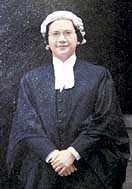
Two weeks ago, Chu went to a Tsim Sha Tsui hotel with two girls and got a
room. Then an ambulance had to be called because he was bleeding in
his private parts. Chu said, "Blood started to pour out of my
dick like water from a showerhead. I was not scared, but the girls were
and insisted that I be taken to the hospital." At the hospital, he created a commotion by calling
his companions "chickens." Last week, he went to a western
district hotel with one girl and got a room. Then an ambulance had to
be called again because he was bleeding in his private parts again.
Once he got out of the hospital, he began contacting the media to correct
the record (specifically, he admitted to the bleeding but insisted that he
did not take any aphrodisiacs).
Here are excepts of the Ming Pao interview at his home: "Yes, I was
patronising prostitutes. What is there to be ashamed
about?" "It is not against the law to patronise
prostitutes. I don't feel any shame! I don't care what other
people think!" "All women are 'chickens'!"
"I have five criteria for girls: First, they must be someone that I
know and worked with before. Second, no condoms. (The next three
criteria refer to positions for sexual intercourse)." Next
he produced a letter in which he thanked the hospital doctors for treating
his schizophrenia and alcohol dependence a few years ago.
Then he got up suddenly and took off his red boxer shorts to show the
reporter that the condition that led to the bleeding was not so serious.

According to the Barristers Association, Chu is still licensed to
practice. He even represented a client in court last year. But
Chu says that his full-time job is a professional stock trader for
himself. He works from home in front of five computer monitors.
In the photo, Chu is wearing his home and street clothes (white t-shirt and
red boxer underwear shorts).
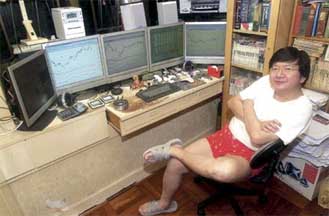
[034] The "Truth" Behind the Gillian Chung Affair (09/14/2006) This particular blog post by mainland Chinese scandal monger/blogger Song Zude (宋祖德) has his Hong Kong counterparts astonished. If you publish this in Hong Kong, it might be the basis of a lawsuit.
[in translation]
... Twins have been around for some time and the two have this innocent and cute act. The audience may be interested for a period. But after a while, they will see that the two are not up to par on either singing or acting. So the money tree known as Twins is not bringing in much money these days. This year, EEG was forced once again to study the possibility of splitting them up and see if a solo career might bring a miracle. Of the two women, EEG valued Gillian Chung more and so they hatched a plan to hype her up with a truly sensational story.
EEG has its own tabloid magazine Oriental Sunday, but it seems logically indefensible to publish snoop photos of your own actress changing backstage in your own magazine. It would be an obvious case of hype. So EEG paid EasyFinder magazine off with the sum of HK$200,000. If EasyFinder should become banned as a result, EEG owner Albert Yeung would assume responsibility; if nothing happens, then the magazine makes big money. So why not? Therefore, the two got together to carry out the farce known as "Gillian changes her bra and gets photographed stealthily".
Thus, in Malaysia, the following occurred: EEG arranged for the EasyFinder reporter to come through the front door and set up the camera. Then Gillian changed her clothes slowly in front of the camera. The truth is so simple, without any exciting details and no undercover activity. It only took a few minutes for the task to be completed. Once the magazine hit the streets, Gillian began her "campaign of tears" to complain about how she was victimized. This is like a slut seducing a decent man and then crying "I was raped" in order to show that she was chaste. Such strange things happen in this world.
To make the show more realistic, Gillian cried everywhere and filed a report at Police Headquarters. The women's organizations protested, the artistes offered their support, the media reported in waves ... as one thing led to another, the objective result far exceeded what both EEG and Gillian expected. This time, Gillian profited immensely. If it were not for such an awful trick, the plain-looking and talentless Gillian would have no chance to be a media headliner!
EEG must be said to be quite successful in hyping up Twins this time. But before the success is the thorough destruction of moral bottomline. EEG is acting righteous and condemning the lack of morals in media, but it is actually EEG and Twins who have no morals. They deceived the public, they deceived many well-meaning organizations, they deceived the police and they deceived artistes such as Jackie Chan and Andy Lau. People who commit so many sins will end badly eventually. Artistes like Twins who dependly completely on packaging and hype will soon enter into the graves of history.
Now my opinion is that the blog post is just rubbish, and it is not even good fiction because the blogger does not understand the more complicated issues (see A Taxonomy of the Gillian Chung/EasyFinder Case) such as politics and personality. Song Zude published his post on August 30. As of September 13, it has more than 25,000 reads and almost 2,000 comments (such as 你个大垃圾,人渣,你怎么不去死呢!(translation: You big piece of trash! Human waste! Why don't you go and die?)).
[033]
For Whom Did The Secretary General Shed His Tears?
(09/13/2006) (Sing
Tao) In the western world (plus Hong Kong and Taiwan), leaders
like Bush, Donald Tsang and Chen Shiu-bian are often presented in
drawings. But in mainland China, it is forbidden to do so until
Guangzhou's XKB (News Express) presented the drawing of Chairman Hu Jintao yesterday on
page A15 with the story: "For Whom Did The Secretary General Shed His
Tears?" This was not a piece of sarcasm, but an inspiring story
about a late Peking University professor who died from cancer and how Hu
Jintao wrote to his daughter with pen in his right hand, handkerchief in his
left hand and tears in his eyes. Official reaction to this breach of
protocol is unknown at this time.

This is a dilemma, isn't it? If you lower the boom on the cartoonist,
you risk being condemned by the international community; if you say nothing,
it will open the floodgates. What will it be?
[032] The Era of the Public Questioning the Proof (09/13/2006) (HXDSB "Strait Metropolis Daily" 海峡都市报). September 10, 2006. (See copy of Chinese original)
[in translation]
At 4am on August 18, Rui'an (Wenzhou) Middle School Number 3 teacher Dai Haijing fell down to her death from her apartment. Due to the resemblance in details with the Gao Yingying case in Hubei and the female teacher Huang Jing case in Hunan, the police once again faced not just an ordinary criminal investigation, but they were also slated to face the customary questioning by the public.
Twenty-two days later, after a joint investigation by the public security bureaus of Zhejiang, Wenzhou and Rui'an, a conclusion was reached about the case: Dai Haijing suffered from mental depression and she committed suicide by jumping out of the building.
Yesterday, our reporter interviewed a Wenzhou reporter who wrote about the details of the conclusions: "Although each detail of the case was investigated over and over and the evidence was powerful, the family of Dai Haijing still cannot believe the outcome was correct!"
Like the case of Hunan female teacher Huang Jing, the death of the pretty Dai Haijing must looked to outsiders that it must be related to her emotional life. Since she was at odds with her rich and powerful husband, the rumors have been pointing at her husband Xie as the suspect. Afterwards, while the police investigation was going on, a forum post about "Is Our Teacher Leaving Just Like This?" was distributed around the Internet. Many people speculated that Xie pushed Dai out of the window, and people linked this with the Huang Jing case: they were worried that the police were paid off to say that Dai Haijing committed suicide.
"It must be admitted that the Wenzhou police endured a great deal of public opinion pressure during the investigation. Therefore, they tried to disclose the evidence for every investigative detail to the public and let the family of the deceased participate in the analysis!" The knowledgeable Wenzhou media reporter believed that the police adequately respected the people's right to know during the investigation.
According to the investigative results published yesterday, the police went through careful examinations and analyses and fully responded to all the aspects that the outside world were questioning.
Of course, empirical experience tells us that no matter how cleanly the police wrapped up a case, no matter howreliable all the supra-modern techniques of collecting evidence are and no matter how the final conclusion is flawless, the final word will have to withstand the test of history. We have observed many such lessons in this county.
At this point, let us not comment on the kind of effort that the Wenzhou police put into the investigation. If we group this case with the Gao Yingying case and the Huang Jing case, then these several cases that drew the attention of the entire nation have a common characteristic: the police produced relatively transparent evidence in order to close the cases (with the exception of the Dai Haijing case, the previous two cases were investigated and re-investigated several times before closure).
This characteristic should be compared to certain cases that were sloppily closed by certain local public security organizations in the 1990's and resulted in the eventual exposure and overturning of a number of false convictions. So we can count on this as a form of judicial improvement and democracy.
The reassuring thought here is that this improvement was obtained under the watchful eyes of the people. It is the minimum requirement in the judicial process to "let the evidence speak for itself," but it was the people who fought to question the evidence and the conclusions. As the police become more concerned about the public's right to know, the cases will become more transparent. That is to say, the era in which the people participate in questioning the evidence in the judicial realm has silently arrived!
Comment: This is one of those sea changes in China that you would not recognize while it was happening bit by bit. Ten years ago, the case would never hit the light of day, whether or not mass incidents occurred. This time, the police were fully aware of the public opinion wave while their investigation was going on. When they announced their findings, their worst nightmare was realized with two major mass incidents. This may trigger a national-level investigation in order to mollify public opinion. What is the difference between now and ten years ago? Would you believe -- the Internet?
Related Link: Suspicious deaths & alleged coverups in China Rebecca MacKinnon, RConversation
[031] Why Won't The Chinese Study Japan? (09/12/2006) (Southern Metropolis Daily) By Geng Xin (庚欣), August 25, 2006.
[in translation]
People who are familiar with Sino-Japanese relationship often have this feelings that even though are many Chinese books about Japan over the past few decades, there are no classical works. Not only is there nothing comparable to American scholar Ruth Benedict's Chrysanthemum and the Sword, there is nothing even to match Dai Jitao (戴季陶)'s Discussing Japan (日本论) in the early Republic days. Why is that? Many people have talked about this subject, but here are some random thoughts of mine.
The most noticeable characteristic of Chinese attitudes towards Japan is contempt. There are two types of contempt. One type is absolute contempt because one thinks that one is superior (even though this is just an inflated self-opinion) not just over Japan but also everybody else. This is a form of "ignorant contempt." The other type is relative contempt, which depends on the object. Thus one takes Europe and United States very seriously, and then one cannot take Japan as seriously. This is a form of "prejudicial contempt." Basically, there is more of this second type around.
... First, it is a historical habit. Over history, Japan had been learning from China for a long time. After the Meiji Reform, the diligently learning Japanese had basically set down China in its policies as a target for conquest, even as the scholastic studies of China continued strongly. Even now, among the reports about foreign countries, the news about China far exceeds all other nations (including the United States).
Second, it is a displacement that occurred as a result of circumstances. During the early 20th century, there was a great deal of enthusiasm in China about studying Japan. Many promising young people went to Japan to find the path to make their own nation strong, and Marxism arrived in China through a Japanese translation. Das Capital and The Declaration of the Communist Party were translated first from Japanese into Chinese. But following Japan's invasion of China and its subsequent defeat, Japan can no longer be treated as a model to emulate, or even study. Thus, there was a displacement in Sino-Japanese attitudes. Although Japan was economically successful after the war, it still does not have high international political standing. Although China had an uneven path of development, it continued to hold a high international reputation. This meant that the misalignment has been reinforced. ...
[030]
I Whine (09/12,2006) I whine once again and I know that
you must be tired of it. I write about The
Case of Dai Haijing and I tell you that all mentions about the case
at Chinese forums, blogs and vblogs have been obliterated. So what is
the rest of the world doing about it? I have seen only Christopher
Bodeen's report at Associated
Press. But I find it extremely disappointing that the
English-language China-themed blogosphere is totally and thoroughly
disinterested in this matter. Instead, the sole response through
Buzzmetiric/Google Blogsearch/Technorait is at a Japanese site Real
China ブログ名とおり、中国の真実を紹介します.
So I am being an advocate once again, but what is your response?
Another yawn? This is not exactly one of those invisible cases given
photos such as these:


[029] Downloading Videos (09/12/2006) Oh my God! I make a small complaint about my inability to download videos (see Comment 200609#024) and I got so many technical tips. Trust me that for the next suddenly breaking incident, there is nothing that I cannot do on YouTube, Tudou or whatever! It was easy as pie as I only have to google the terms. Unfortunately, I have lost the original Tudou link, but here is a nowhere-as-exciting YouTube video (9月8日温州塘下市民政府抗议�戴海静案惹民怨�武警出动反暴组).
[028] The Searchers (09/12/2006) In response to a request on further information related to Sex and the Chinese Bloggers, here are the top search results (from known search engines, such as Google, MSN and Yahoo and their various local versions) from May through August. I'll be damned if I know why "Lingnan translation entrance exam" ended up here!
May 2006 June 2006 July 2006 August 2006 6385 bus uncle
2318 uncle bus
445 hinano mizuki
413 eswn
409 sex141
357 girl pics
327 eastsouthwestnorth
307 super girls
265 nude chat
249 mizuki hinano
234 nancy kissel
231 hong kong bus uncle
217 bus uncle video
177 zhang ziyi nude
165 wang guiquan
137 voodoo dolls
135 super girl
126 loke soon choo
114 lingnan translation entrance exam
103 east south west north
27893 [not listed: 17,585 search terms]6205 bus uncle
1929 uncle bus
552 sex141
535 eswn
460 hong kong bus uncle
342 hinano mizuki
336 eastsouthwestnorth
330 naked ladies
305 chen dan changsha
301 girl pics
204 nude chat
175 bus uncle hong kong
168 super girls
151 liu zhihua
147 super girl
141 www.sex141.com
124 mizuki hinano
122 east south west north
121 porn
120 bus uncle video
26181 [not listed: 15,452 search terms]601 sex141
559 porn
505 eswn
426 bus uncle
294 eastsouthwestnorth
205 girl pics
198 nude chat
181 hinano mizuki
149 naked ladies
129 www.sex141.com
114 uncle bus
93 rainie yang
89 sex141.com
88 zona europa
81 july 2006 msn web page article intelligence health and income
77 hong kong girls
75 yin ling
72 hong kong bus uncle
70 liu zhihua
19587 [not listed: 12,749 search terms]974 gillian chung easyfinder
961 easyfinder magazine
690 porn
671 bikinikungfu
657 sex141
557 easyfinder weekly
527 eswn
418 easyfinder gillian chung
391 eastsouthwestnorth
319 bus uncle
232 easyfinder issue 761
227 easyfinder gillian
226 gillian chung bra
225 gillian chung easy finder
202 nude chat
187 bikini kungfu
184 easyfinder hong kong
183 super girls
173 girl pics
157 this goes to show what a stolid and unimaginative fish china man
31355 [not listed: 17,571 search terms]
[027] Internet Publishing for the Political Worm (09/12/2006) (Tianya Club)
[translated in summary]
In the autumn of 2005, a story in Southern Weekend about The Most Popular Forum Post Ever In China drew my attention to the Tianya Club forum. From that moment on, I read many more famous posts that fascinated me. After reading so many interesting posts, I got tempted to get try my own hand. Since I am decent in writing, why wouldn't I write about what I have seen and read over the years? Although I am just a low-level government official, I am still more informed than those newcomers or 'excellent' university students. I should share my experience with them so that they will make fewer mistakes, earn fewer scoldings from the leaders, waste less time on professionally unproductive work ... and to bring them up to become the successors of socialism and build up the eternal enterprise of harmonious society. Therefore, I wrote The True Life of a Political Worm. Thanks to the recommendation of a renowned netizen and the attention of the forum master, I was able to garner a large number of page views over many months. I thank the two of them as well as all other netizens for their support.
After having dozens of sections of this continuing saga, publishing editors began to approach. They said, "You write well and you make official business so funny. If you get it published, you may make some money." I said, "Great, but would you dare publish it?" As soon as the proposal reached their leaders, it was rejected because the reason was uniformly: this will never make it past the political examination.
Finally, there will be a book published in the autumn of 2006. The decision-maker just sneered at the so-called problem of direction: "This is just the usual silly stuff that you see in official circles in China. It can't be that serious, right?" That was the China Drama Publishing House. I admire the China Drama Publishing House from deep in my heart.
The book can be summarized as "True" and "Funny." As for how it is true and funny, you will have to read it. The book costs 20 RMB. If you just treat it as what happened during a round of mahjong, it is not that expensive. The target groups of the book are: entry-level political worms and regular political worms. It is an excellent book for your own reading or as a present. When you have spare time besides preparing for the public servant entrance exams, you should give this book a read and you may get some illuminating ideas!
[026]
9/11 (09/11/2006) I took this photo on October 15,
2000. Less than a year later, the cityscape would be changed.
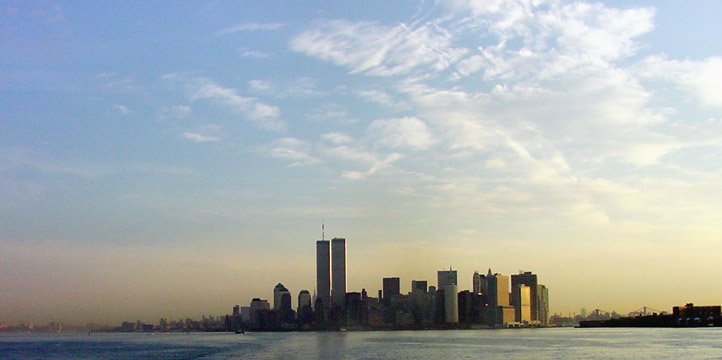
I won't have anymore to say except to ask you to read Steve Gilliard's Thoughts on 9/11.
P.S. Like Steve, I hate blue-sky days (known as 9/11 days).
Relevant link: Remembrance
Sam Crane, The Useless Tree
[025] A Business Model in China (09/11/2006) China has a population of 1.3 billion people. If you can fleece 1 RMB from each person, you will have 1.3 billion RMB in your pocket. Not bad, eh? This is why P&G, Unilever and the rest of them are in China. Size matters.
(Apple Daily) In Ezhou city (Hubei province) earlier this year, the Internet monitoring department of the public service bureau received a tip that someone was running a porno website to fleece consumers. The police has now arrested 11 individuals.
How much money did the criminals make? 120 million RMB.
The gig works like this -- the group took out Internet ads at more than 32,000 different websites hinting that they are offering "one million sensational movies," "100,000 sexy movies" and so on. Furthermore, the viewing and downloading will be free with a monthly subscription fee of only 2 RMB. All the netizens have to do is to use their mobile phones to transfer an initiation fee of 30 RMB. 4 million people fell for that. 4 million x 30 RMB = 120 million RMB. The 4 million people sent in the money and never received a thing. But what could they do? Call the police to complain that they never received the illegal merchandise?
[024] The
Missing Video Clip (09/11/2006) While I love those video sites
(such as YouTube and TuDou) for hosting videos for free, there are moments
when I wish that I know how to download a clip and host it on my website
instead. Yes, I know that it costs me bandwidth. Strange, eh?
Yesterday morning, I was still checking the Google and Baidu caches for
whatever has not been wiped out in China on The
Case of Dai Haijing. There was an amazing camphone clip of
duration 1:04 taken from a higher floor showing how the police went about
beating the demonstrators. When I watched it on Tudou, it already had
113,000+ viewings. I knew that this clip was not going to there much
longer. But how could I download it? There were only
instructions on how to link it, or set up a window on your own
website. Anyway, I went out in the afternoon and when I came back, it
says "the page I was searching for does not exist or has been
deleted." And I didn't even get a screen capture.

[023] New Media Legislation in Hong Kong (09/11/2006) Read Twin rumpus may leave legal mark by Jonathan Cheng in The Standard. By coincidence, there is a column by 李先知 in Ming Pao on the same topic.
[in translation]
... The Gillian Chung affair may have cooled down for the moment, but this does not mean that the media can rest easy after all sectors of society condemned this type of snooping activity. Senior government officials privately warned that their internal public opinion polls showed that the citizens are extremely dissatisfied with the media, including some people who support legislation to stop the media from snooping. "It is no joke" and "public opinion is completely not with the media."
... Although the public opinion has been clearly against the media, the opinion of the media themselves is also clear -- they oppose any legislation. The various journalist and media organizations all publicly oppose any legislation. The government sources also said that while the public opinion is presently one-sided against the media, such opinions can shift rapidly. If the media organizations should then raise the banner of freedom of press and object to the legislation, the public opinion may make a 180-degree turn. Then the Legislature will probably turn around and ask the govenment, "Why do you want to control the media!" Thus, we cannot count on the current public opinion.
[022] China
Restricts Foreign New Agencies (09/11/2006) For background,
see China Law Blog: China Restricts Foreign Press Within China -- Is This New?
and China Restricts Foreign Press Within China -- An Update From The Hutong
and especially Silicon Hutong's Xinhua:
Trying to Save a Dying Monopoly.
My overall impression was this was de facto what has been happening
all along. I do not recall seeing local Chinese newspaper printing
Associated Press or Reuters reports about China. Of course, they do
rely heavily on foreign news agencies for foreign stories (see, for example,
this 9/11 story in today's Southern
Metropolis Daily).
(Ming Pao)
The response in Hong Kong is more specific and parochial -- the restrictions
include all news publishing organizations in Hong Kong, Macau and
Taiwan. In Ming Pao, the Hong Kong Journalist Association chairwoman
Serenade Woo said that the new regluations will affect Hong Kong's news
organizations, restrict freedom of press there, damage the citizens' right
to know and get more journalists into legal trouble. Woo asked the
Hong Kong SAR government to reflect the importance of freedom of press in
Hong Kong to both the State Council and Xinhua. She also believes that
in this information world, it would be hard for mainland China to implement
the regulations as stated.
My impression was also that the local Chinese newspapers have never
re-published any news stories from Hong Kong newspapers, regardless of their
political positions. From Apple Daily through Ming Pao to Oriental
Daily/The Sun, the stories are just not used in mainland China. The
exceptions might be Ta Kung Pao and Wen Wei Po, which are pro-Beijing all
the way. So
this is again de facto what has been happening all along.
Ming Pao also cites an anonymous Beijing-based reporter for a foreign news
agency: the relevant Chinese departments have always strictly controlled the
direct use and purchase of stories by local organizations from foreign news
agnecies. If there is a need to use a story, Xinhua must approve and
then make the purchase. Concerning the right for Xinhua to delete
those foreign news agency reports that "damage national security and
image," this reporter said that the boundary of the definition is
vague. Based upon what he knew, Xinhua basically does not use news
reports from foreign news agencies on China, because they believe that there
are too many negative news and they don't want the Chinese people to see the
other side of society.
From ReporterHome.com
(Xici Hutong), here are the comments:
9/11/2006 17:16:16 Jason: Post was deleted by admin.
9/11/2006 17:22:16 c110zj: Post was deleted by admin.
9/11/2006 17:46:36 无心...:
"Before a meteor enters the atmosphere, I heard that it needs a pass
from the space station.
Relevant posts:
Web postings criticize formalized curbs on Chinese media cooperation with foreign newswires
China Media Project;
New media controls: Follow the money Image Thief
China tightens rules on foreign media
Chris Oliver, MarketWatch
Experts
agree: Xinhua wants the cashola Image Thief
[021] How
Things Got From Bad To Worse (09/11/2006) Two crime reports in
Hong Kong:
(Ming Pao)
In Soy Sauce Street in Mongkok, a burglar spotted an open window on the
fourth floor. So he walked up to the roof, climbed down the water
pipes on the exterior of the building and entered through the window.
To his surprise, the apartment was a warehouse for pirated adult VCD's with
nothing else of value there. So he had to leave empty-handed via the
same path. But on the way back, he got stuck midway because he was
wearing socks without shoes and he could not get enough traction to move
upwards. The fire department had to be summoned to rescue him.
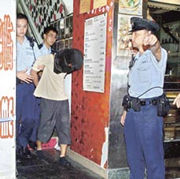
(Ming Pao)
In the Lai Chi Kok area, a man began to take a hike around 5pm yesterday in
the trails. Then he lost his direction and kept wandering
around. At around midnight, he was walking in the dark when two men
and one woman emerged from the bushes to announce a robbery. One of
the men held a gun and the woman had a knife. The man fled and
eventually found help from the resident of a shack. Since he reported
that the robbers were armed, the police mounted a search. The man did
not lose any property, but only sustained a slight injury in his left leg.
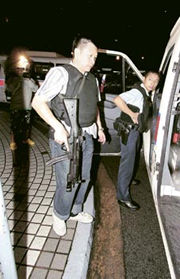
[020] Mao's Death - 30th Anniversary (09/10/2006) (Apple Daily)
[in translation]
Yesterday is the 30th anniversary of the death of former Chinese Communist Party Central Chairman Mao Zedong. There were no official commemorative activities. More than 10,000 citizens showed up at the Beijing Mao Zedong memorial hall to view his body. Former editor of Freezing Point (in China Youth Daily) Li Datong said that Mao's deeds were like a "double-edged sword" to the Chinese Communist authorities. The Chinese Communists will avoid highlighting his rights or wrongs and not change their assessment of him.
Zhou Ruijin, former deputy chief editor at People's Daily who also wrote under the pen name Huangfu Ping, also said that the old scores have been settled and there are no more historical entanglements now. In 1981, the Chinese Communist Pary Central had offered "The resolution on certain historical problems in the party since the founding of the nation" and assessed Mao as "70% right, 30% wrong." This assessment of Mao is unlikely to change much now.
Li Datong said that the political legacy of Mao was that "class struggle is the basic engine of social development." This is absolutely useless to the present political rulers. When Mao held power, his economic policies were to "run amok" and caused huge catastrophes for China. Morally, there is nothing much praiseworthy about Mao, unlike former Premier Zhou Enlai who represented a moral paragon. Therefore, the Chinese Communists are unlikely to publicize Mao's contributions.
Li Datong said that actually, the last 30 years of market economy and social reform in mainland China were fundamentally the result of changes that were "against Mao" and therefore negated his legacy. But even so, the Chinese Communists will not publicly negate what Mao did. "Once you get started to talk about it, then everybody played a part in it." Just like Mao, the present Chinese Communist government is the product of the same autocratic system. Therefore, they will not turn around to criticize Mao.
[019] A
Tale of Two Newspapers (09/10/2006) On the front cover of
Taiwan's Apple
Daily. The headline: Angry anti-corruption wave; the whole
world is watching.

Meanwhile, here is the screen capture over at the Liberty Times
website. What protest demonstration? There is no stinking
protest demonstration! Give us baseball! The only mention of the
event was in English, with the headline in Taipei Times being "Protest
turnout lower than expected." It would have been too
embarrassing for this story to go entirely missing in Taipei Times because
the 'whole world' is watching on other sources. The Taipei Times story
is actually well-written but the headline was dishonest.

[018]
Taiwan By The Numbers (09/10/2006) (ETTV via ChineseNewsNet)
(Survey completed on September 9; no methodological details)
- 22% satisfied with President Chen Shui-bian; 58% dissatsfied.
- 25% think Chen Shui-bian fit to be president; 58% think unfit
- 48% support anti-Bian activities; 33% oppose
- 34% approve of the activity continuing until A-Bian leaves; 50% disapprove
- 83% do not think President Chen Shui-bian will leave; 3.7% think he will.
[017]
The Hong Kong Blogosphere is Ready for Prime Time
(09/10/2006) I have been mumbling about this, but at some point the
Hong Kong blogosphere is ready to take on the Hong Kong mainstream media in
commentary. The only question is when that moment has arrived.
So let me be the person who declares that it has arrived.
On Setpember 5, I translated three articles from Apple Daily in defense of
the EasyFinder photographs of artiste Gillian Chung changing backstage (see In
Defense of the Realm). In that post, I also translated a rebuttal
from Diuman Park blogger 葉一知.
There is also another untranslated blog post at Pandemonium titled 偉大的反共文豪.
And 葉一知 has also drawn a
parody at Who
Is Miss A? using the same arguments applied to another case.
What can I say? I declare at this time that the Hong Kong blogosphere
(at least, the Chinese side of it) is powerful and erudite enough to match
up with the mainstream media
columnists and commentators. Beijing blogger Chris Waugh agrees (see link).
Furthermore, the Hong Kong bloggers will serve a watchdog function on the
media itself, because any commentator resorting to laziness or inattention
will be shred to pieces in front of a large public!
Relevant Link: 全民監察,天下無blog
倉海君,新春秋
[016] The
Ruian Incident Has Been Disappeared (09/10/2006) I woke up in
the morning and I read about the two mass incidents in the city of Ruian on
September 7 and 8 in the South China Morning Post. I went through the
Chinese forums and blogs to pick up the amazing photographs in The
Case of Dai Haijing. Then I went out. When I came back in
the evening, all the forum and blog posts have now been disappeared.
For example, the NetEase photoblog (-╄BaǒB�i的相册)
is overridden by this message: "This photo album was in violation of
the terms of service of NetEase and service has been stopped."
Even the report in Hong Kong's Ta Kung Pao has been removed (see copy in the
Baidu
cache).
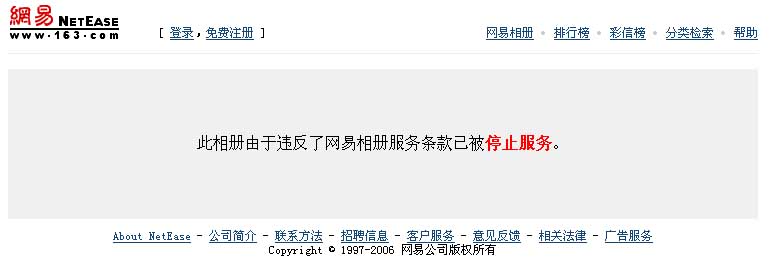
In My
Life As An Activist Journalist, I have given my game away. There
are moments when I become an activist and advocate. But you are going
to have to move me into that role. In the case of Dai Haijing, I noted
forum comments that went something like "Does anyone know how to
contact the Hong Kong media about this? Our local media are
useless!" and "If we cannot post on this case here, we are going
to have to let the international media know about this!"
Therefore, as in the FoxConn case, I hope that the western and Hong Kong
media see that in addition to news value, they have the hopes of the people
pinned on them.
My initial attention on this matter came in a brief comment (Comment
200608#090). That was in fact enough to generate some
cross-postings of an English-language post inside China. For example,
this post (http://www.ku40.com/html/15/15_itemid_1830.html)
carried my entire comment in English with a biography at the end: "译者系 香港 宋以朗(Roland Soong) 先生,早年留美,曾任美联邦调查局数据分析员,多家传媒企业顾问。其祖戏剧家宋春舫,其父翻译家宋淇,诗书传家,富而仁义。现退休居香港,向外界翻译介绍国内动态,在国际传媒界声名卓著。".
Why? Because people inside China felt that it was important to get
international attention. And they appreciate any attention.
While there is some doubts about the case itself, it is undeniable that mass
incidents occurred on September 7 and 8. This case has all the
ingredients of an explosive case: a pretty woman, a spineless and abusive husband, a
mysterious suicide, a hastened police inquest, suspected business-government
collusion, an irate student body, internet censorship and a
couple of mass incidents involving tens of thousands of people. Can I
at least pitch this story to you on news value, if not on absolute value?
[015] Taiwan
By The Numbers (09/09/2006) (China
Times) (China Times-CTS interviewed more than 1,000 adults on
September 7).
- 72% do not believed that President Chen Shui-bian has yet to explain any
of the corruption scandals clearly, but instead played various word games;
5% believe that he has explained everything clearly already.
- Among pan-greens, 46% do not believe that the president has explain
everything clearly and 19% believe that he has explained clearly already.
- At the Palau press conference, President Chen Shui-bian said that he did
not want to disclose the names of the friends who lend jewelry to his wife
because of security considerations. 70% of the respondents thought
this was unbelievable and 11% accepted this explanation.
- Among pan-greens, 46% accepted this explanation.
[014]
The Most Beautiful Non-Reporter in China (09/09/2006) In
The
Most Beautiful Female Reporter in China,
Henan TV reporter Cai Aiwen put aside her job in order to resuscitate a drowned
girl and thereby missed her story. At the Tianya
forum, a netizen examined the photograph carefully and concluded that her ID
badge was not issued by the General Administration of Press and
Publications. Instead, it was just an office building pass. Thus, she is ... gasp! ... a fake reporter!

How did the netizens respond? Here is my favorite: "Yeah, she is
not a real reporter alright. Real reporters are incompetents with no
heart. So she is not a real reporter."
[013] Google
in Brazil (09/09/2006) [Google carves a middle path on privacy
Andrew Downie, Christian Science Monitor] This may have just happened
in Brazil, but it is relevant to China. Google runs a popular social
networking site called Orkut. Although the site is meant to be global,
it is dominated by Brazilians. The Brazilian government wanted Google
to handle over the data for certain suspected criminals, but Google refused
to hand over the IP address and other data because the information is stored
on US servers.
Into the mix came an unusual group -- Brazilian human rights groups were
infuriated at Google. By their count, more than 40,000 images of child
porn was posted on Orkut since the beginning of the year. There were
thousands more communities dedicated to racism, violence, anti-Semitism and
cruelty to animals.
Google's defense was technical in nature. For example, they refused to
comply with a judge's order issued to its local Google Brasil subsidiary on
the grounds that the Orkut servers were located in the United States.
But eventually Google ran out of options. Besides, defending the
privacy of alleged pedophiles and racists is not a winning cause.
Nicole Wong, associate general counsel for Google Inc., says, "It is and always has been our intention to be as cooperative in the investigation and prosecution of crimes as we possibly can, while being careful to balance the interests of our users and the request from the
authorities. We have and will continue to provide Brazilian authorities with information on users who abuse the Orkut service, if their requests are reasonable and follow an appropriate legal process."
What do you suppose will happen when the Chinese government makes such a
similar request? Maybe the crime isn't child porn, but it is something
like disrupting social stability. Will Google or the US Department of
Justice get to decide whether this was a reasonable law?
[012] Ching
Cheong Again (09/08/2006) According to Ming
Pao commentator Li Sin-chee (李先知),
on the day before yesterday at 8:50pm, an unknown party sent an SMS to a
Ming Pao reporter: "The Ta Kung Pao website will have an exclusive
report on Ching Cheong at 9pm." When the reporter went to the
website, he found the long article "The Key To The Ching Cheong Case:
He knew that it was a spy organization but he still accepted the assignments
(程翔案關鍵:
明知間諜組織仍受領其任務)."
Commentator Johnny Lau said: "Ta Kung Pao is pro-Beijing and the
viewpoints of this 'exclusive story' are from the official side, so the
information must have been released by the mainland authorities to persuade
certain supporters of Ching Cheong that the verdict of the court was
proper." Previously on Monday, a copy of the court verdict
document appeared on the Internet (see translation at Danwei).
The Ta Kung Pao report confirmed that the verdict document was
authentic by citing an "authoritative source." So
what is in this Ta Kung Pao report? Here are the six points summarized
by Ming Pao:
1. During the preliminary interrogation
and without being forced or lured, Ching Cheong admitted that he
"knew that the Foundation on
International & Cross-strait Studies was a spy organization, but still
accepted the assignment."
2. During the court trial, Ching Cheong reversed his initial
testimony. But the court saw the videotape of the original
confession, which neither Ching Cheong nor his lawyer objected to.
3. The prosecutor and the defense went through three rounds of debate,
and Ching Cheong wrote 12 pages of opinion in his own defense. His
right for self-defense was adequately exercised.
4. The Foundation on
International & Cross-strait Studies is a spy organization as classified
by the Chinese Ministry of National Security. If mainland scholars
and others only attend forum activities organized by that organization,
it is not a crime. But to know that it is a spy organization and
still accept its assignments that endanger national security is to be
guilty of the crime of espionable.
5. For outsiders, Ching Cheong did not seem to lack money and he was a
firm patriot. But one cannot say that a patriot never commits
crimes.
6. The verdict on Ching Cheong does not mean that news gathering on the
mainland is akin to stepping in a "minefield." The
definition of espionage by China is a vast improvement over the 1979
criminal law code.
[011] Lost in Translation (09/07/2006) From Jane Macartney's Lost In Translation:
This morning China's premier, Wen Jiabao, granted a rare audience to five news publications. The Times was one of those fortunate enough to be chosen for the small group interview before he sets off on a European tour that will take him to Finland, Britain and Germany. The interview lasted an hour. It was only 13 hours and 43 minutes after it was all over that the government issued its official transcript in Chinese and in English.
Why the delay before I could issue the article? Every word the premier uttered had been recorded on a phalanx of tape recorders lined up by the journalists with military precision on the table beside his armchair.
...
Are there perhaps cautious mandarins busy behind the walls of the Zhongnanhai government compound whose task it is to tinker with the premier's words just in case he didn't really mean what he said? The saga certainly prompts one to ponder. How deep into the system does censorship stretch? I confess I didn't notice anything particularly sensitive, let alone controversial, in the before version or the approved version. But the final text is at last available.
Now I have no idea why this happened. But, as a professional translator, I noted this bit of Q&A:
Q: What book do you most like to read before you go to sleep at night, and when you put the book down which of China�s problems most often keeps you awake?
WEN JIABAO: You are actually asking about my reading and thinking. Let me quote you some lines from the poems of famous literary figures, both Chinese and foreign. They will tell you something about me, what is on my mind, and what I read. They are as follows: �While I have little possession at hand, I care deeply about my people across the land. Having devoured ten thousand books and drawing inspiration from ancient thinkers, I have the whole world in my mind.�
�To ordain conscience for Heaven and Earth, to secure life and fortune for the people, to continue lost teachings for past sages and to establish peace for all future generations.�
�Long did I sigh to hold back tears; saddened I am by the grief of my people.�
�Lying in bed in my official residence, I heard the rustling of bamboo outside, and it just sounded like the moaning of the needy�; �There are two things that fill my mind with ever increasing admiration and awe: the starry sky above me and the moral law within me.�
�You ask why my eyes are always filled with tears. It is because I love my land dearly.�Now if I was the translator who heard this played back on the audiotape, I would be in total panic. I would have to go back and research these phrases, because I cannot afford to have a single error (note: there is no worse crime than messing up Chinese poems -- you are supposed to have memorized every single one of them!!! I haven't and that's my problem!!!). And then I would have to be very careful about the translation. Perhaps the reporters had let their translators do a draft translation first, and then it should be interesting just how well either their Chinese transcripton or English translation matched the official version.
Fortunately, if you read Chinese, the 五斗米的BLOG has tracked down these quotations.
[010] Chinese
Internet Citizen Detectives (09/07/2006) (Southern
Metropolis Daily) A professional soccer player in Shenzhen, Lu
Bofei, was assaulted by two robbers. By his own account, at around 9pm
on the evening of September 4th, he was walking alone on a pedestrian
overpass. Suddenly, two men appeared from behind, grabbed him, placed
a knife on his neck and announced that it was a robbery. Lu resisted
instinctively and was slashed several times. He cried for help and
some citizens came to his assistance. The robbers fled the
scene. Lu was sent to the hospital. The police are investigating
the crime.
So this is a violent crime, but what has Chinese Internet citizens
detectives got to do with this?
The news was reported in SMD, and subsequently carried by the major portals
such as Sina.com, Sohu.com, NetEase.com, Oeeee.com, etc. At Sina.com,
there was an online poll -- as of 9:30pm last night, out of 10,068 persons
who took the poll, only 6.1% believed that this "happened accidentally
during a robbery while 71.1% believed that "there must be another
explanation." At NetEase.com, 5,529 persons took the poll,
and 49% chose "the incident cannot be so simple."
Why the doubts? Here is an example of an inconsistency that struck the
netizens who read the news reports. Lu Bofei claimed that the incident
occurred around 9pm on September 4, but he arrived at the hospital at 3:30am
the next morning. Where was he in between the times, especially since
he was seriously injured? The soccer team's spokesperson said that the
incident occurred around midnight and Lu was sent immediately to the
hospital.
[009] The Wang Shih-cheng Affair (09/07/2006) Before I left for Beijing, I had covered the preview of the Wang Shih-cheng affair (see Comment200608#118). In brief, Next Weekly had conducted a surveillance campaign on DPP legislator Wang and caught him checking into a motel room with his ex-assistant. That preview caused a media storm for which Wang held a press conference in an extremely incompetent manner (see the video at
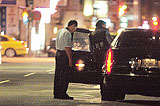

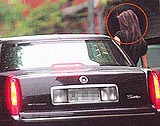
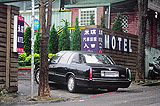
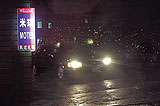
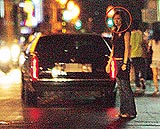



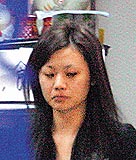
[008] A Taxonomy of the Gillian Chung/EasyFinder Case (09/07/2006) (Metro Daily; no link). Commentary by Tsui Shiu-ming. September 6, 2006, page 6.
[in translation]
[... in the beginning of the essay, Tsui named and described the three Apple Daily essays that are translated at In Defense of the Realm]
... I must say some words in fairness to Next Media. The truth is that no matter how clearcut a social incident is, somebody will exploit it to achieve their own goals. Objectively, there are at least four types of people who are interested in using the snooping incident to "attack" EasyFinder and also Next Media:
Commercially: Other weekly publications like EasyFinder; direct competitiors of Next Media in circulation and advertising.
Politically: Pro-mainland and pro-government media and political figures who detest Next Media for "opposing the mainland China and creating chaos in Hong Kong."
Personally: Celebrities (especially rich people and artistes) who are afraid of being exposed by the paparazzis of Next Media.
Morally: Parents, educators, religious figures, youth workers and others who are concerned that the next generation of Hong Kong'ers will be contaminated by pornography and violence.
You don't need me to tell you, but I think that you can take this taxonomy and find many people and organizations that fit these four classifications. But should we deny that EasyFinder must pay a price because there are so many people who want to see Next Media get ruined? In the final analysis, it was EasyFinder which started it all. If you don't want a knife in your head, you better examine your own behavior. If you behaved poorly and now you want to to use freedom of press and the hypocrisy of actors as a shield, wouldn't that be too easy? Besdies, if the artistes and the media have a symbiotic relationship, then why do the artistes have to endure all the troubles but the media suffer no consequences? If we agree that the "black hand" behind the people who assaulted legislator Albert Ho deserves greater punishment than the men who carried out the assault, then shouldn't EasyFinder have a greater responsiblity than the photographer whose photos were published upon the decision of the magazine?
This is to say that I do not agree with any legislation to supervise the media. I am only saying that behind all the grand talk, there are complex political positions and private interests. If you just study the florid language, you will miss the point.
[007] Taiwan
By The Numbers (09/06/2006)
(China
Times) (CNN/TIME commissioned the research company TNS to
conduct a public opinion poll August 28-30 of 300 Taiwan citizens; warning:
smallish sample).
- 64% wants President Chen Shui-bian to leave his post; 19% wants Chen to
complete his term; 17% had no opinion.
- Among those who wanted Chen to leave: 53% independent; 32% KMT; 5% DPP; 5%
other parties.
- Among those who wanted Chen to stay: 32% independent; 9% KMT; 35% DPP; 18%
other parties.
(China
Times) (China Times interviewed 706 adults in Taiwan on
September 5 by telephone, using numbers randomly selected from the telephone
directory and then randomizing the last two digits. The sample was
weighted by age, sex and region).
- 43% support Shih Ming-teh's campaign; 27% oppose; 30% had no opinion (on
August 17 when the campaign was started, the support level was 47%; on
August 24, the support level was 42%; also the opposition level was around
30% on the last two surveys).
- 5.3% said that they will definitely attend the sit-in; 7.7% said that they
might; 87% said that they will not attend personally.
- 8.3% are confident of success; 63% said that A-Bian will not quit no
matter what.
- 55% said that KMT chairman/Taipei City mayor Ma Ying-jeou should remain
neutral; 15% said that he should participate in the sit-in.
(United Daily
News) (UDN interviewed 939 adults on September 5 (with 470
refusals). The sample was based upon the Taiwan residential telephone
listings with the last two digits being randomized)
- Performance of President Chen Shui-bian? 18% satisfied; 62%
dissatisfied; 18% no opinion
- Performance of Democratic Progressive Party? 18% satisfied; 61%
dissatisfied; 20% no opinion
- Performance of Ma Ying-jeou? 53% satisfied; 27% dissatisfied; 20% no
opinion
- Support Shih Ming-teh's one-million person anti-corruption anti-A-Bian
movement? 44% support; 39% does not support; 17% no opinion
- Will President Chen Shui-bian leave as a result of the campaign? 5%
yes; 76% no; 16% no opinion.
[Note: some survey results have been omitted here]
[006] Bus
Uncle Does Taiwan Politics (09/06/2006) Remember the
individual known as Bus Uncle?
He was taped in an argument in late April and he was a global celebrity in May
and June. He managed to stay in the limelight by being assaulted by
unknown men at the restaurant where he worked. He went out of the
limelight when his boss's wife threatened to kill herself unless Bus Uncle
was fired. So out he went.
What did he do to get back in?
(The Sun via Wenxue
City; ETToday via Yahoo!
News) On the evening of September 5, 2005, Roger Chan (better
known as Bus Uncle) came from Hong Kong to Taiwan in order to participate in
the anti-Bian sit-in. People quesioned why a Hong Kong person is doing
there, but Chan said that he was a Taiwan person who moved to Hong Kong and
he came prepared with his own anti-Bian equipments and songs. Chan
said that he going to set up a political party in Hong Kong to support the
pan-blue camp, and he has invited Shih Ming-teh to become the party
chairman.
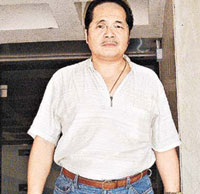
Great! Yes, but there is a way to top this story -- if you can believe
it!
(TVBS via Yahoo!
News) In less than 24 hours' time, Bus Uncle is ready to leave
Taiwan for Hong Kong again. Originally, he planned to stay about half
a month for the anti-Bian sit-in. Roger said: "I felt that the
anti-Bian headquarters is just like the guy who took only 50 paces laughing
at the other guy who took 100 paces. Their movement is not a
movement. They don't have the spirit of a movement. They are
running a business. A movement to make money." Question:
"Are you disappointed?" Chan: "I'm disappointed.
I feel that I will still have to support A-Bian. A-Bian is better than
they are."
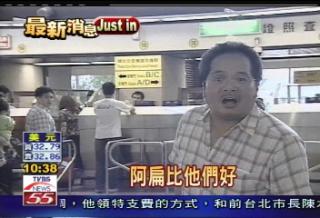
Roger Chan promises to be back in Taiwan on September 9, but it will be in
order to support A-Bian.
[005] Internet vs. Newspaper (09/06/2006) (Apple Daily) Yip Yiu-wing (
[translated with some editing cuts]
Recently, I wanted to borrow a little space from Apple Daily to speak about the Gillian Chung/EasyFinder affair on behalf of a group of netizens who are able to express their thoughts in an independent and untampered public opinion platform that has no interest ties with any parties. I listed the completely different viewpoints and analyzed the reasons within. The next day, the so-called "righteous newspapers" hinted that I am an Apple Daily hired help and they also called the Internet public opinion platform as "a small circle for certain individuals to whinge and has no representativeness to speak of." As a netizen, I must defend the Internet as an independent platform for represenative public opinion.
...
Perhaps the Internet public opinion platform is ordinarily just a place for a group of people to joke, laugh, vent and argue and it has also created many silly and ridiculous stories. But it has also created certain legends. For example, a group of netizens once ran their own fund-raising campaign to take out an ad for universal suffrage in a newspaper; as another example, netizens have exposed a certain "righteous" newspaper for staging a farce about how their 'readers' were fighting to claim the free gifts. The ability of the netizens to think, observe and take action is just as good as any other social group. Through interaction and exchange, they can often easily take apart certain carefully packaged lies, or else highlight the pathetic nature of certain bad arguments.
More importantly, the Internet plaform is an independent channel for dissemination and exchange, and it cannot be monopolized by individual persons. So when we find certain mainstream media are attempting to instill the dominant ideology in society, the Internet becomes a more trustworthy barometer of public opinion and a speech platform in which thinking, exploring and speaking are not interfered with. The contempt that the "righteous newspapers" showed towards the Internet public opinion platform demonstrated that they are terrified of the little child who exposed that they are the Emperors without Clothes.
[004] Sleeping With The Fishes (09/06/2006) More censorship in China!!! In the name of history, I have resurrected this Shanghai Daily opinion column from the Google cache.
(Shanghai Daily) Huangpu's fishes awaiting ungentlemanly "chinabounder". By Douglas Williams. September 4, 2006.
The hunt is on for "chinabounder," a blog portrayal of a cad who came to Shanghai as an English teacher and engaged in a series of sexual exploits, documenting each and every one in lurid detail. This has angered a lot of people, not the least of whom are the many foreigners who call Shanghai home.
The short term-ism of this approach may precipitate an even shorter stay for such a person, but for those of us who plan on being here for a while this blog does nothing but harm, exacerbating an already sore point. The opinion has been posited that were a Shanghainese man to go to "chinabounder's" native UK and record his bedroom shenanigans nobody would bat an eye.
That may be, but were "chinabounder" to switch location and repeat his performance as "sicilybounder," the chances are he would not be of this world for long.
Not the sort of guy to be stuck next to on a long haul, "chinabounder" clearly demonstrates an idiom he may have taught: Empty vessels make the most noise. Then there is the nugget of information the blog offers about "chinabounder." Before arriving in Shanghai he had been singularly unsuccessful with women, having had a grand tally of one UK girlfriend by the age of 35/36.
Let's not forget that this is a blog and not subject to verification. I suggest "chinabounder" is actually likely to be the fantasizing of a frustrated English teacher or even a group of people. One can only imagine the blog's biggest fans are other similar types who enjoy reading such rubbish.
Let's hope that if there are any fish in the Huangpu the "englishonanist" will soon take a swim with them.Why was it removed from the Shanghai Daily website? Maybe the editors found out only after publication that "sleeping with the fishes" means "killed and thrown in a river, ocean, water body" as in The Godfather movie:
[Tessio brings in Luca Brasi's bulletproof vest, delivered with a fish inside]
Sonny: What the hell is this?
Clemenza: It's a Sicilian message. It means Luca Brasi sleeps with the fishes.
[003]
August
2006 Website
Statistics (09/05/2006) For the month of August 2006, the total
website statistics were:
- 6,311,336 hits (including htm, jpg, gif, wmv, xml, etc)
- 502,744 page views (htm files only)
- 411,421 unique sessions
- total time spent = 81,218 hours
- bandwidth = 125 gigabytes
On an average daily basis:
- 203,592 hits
- 16,218 page views
- 13,272 unique sessions
- 11:51 time spent per unique session


Monday Sep 4th 7.30pm
Internet Publishing in China: Panel Discussion
Explore the issues and challenges surrounding internet publishing in one of its most exciting and dynamic regions, with three confirmed experts in the field - Jeremy Goldkorn (danwei.org), Roland Soong (EWSN.com) and media mogul Hong Huang.
Free.Meanwhile, blogging will probably dwindle to nothing. I think I deserve a break after a most exciting week. And when I come back, it will be even more exciting with Please join us for interlocals dialogue!.
But here is a couple who did not get affected by the hazy, hot and moist weather:

If I really didn't want to do anything this weekend, I should not have stated that I'm in Beijing. Michael Anti read the blog, found out that I was here and rounded up a crew of bloggers and media workers to take me down to the famous Liqun restaurant (see Intelligent Being's description in Chinese) to eat roast Peking duck. There were nine of us and we ordered three Peking ducks -- we couldn't finish because it was just too much!
Archives